2022 Activity Report
March Activity Report
31 March 2023
Global Japan Office Coordinator
Leonardo Brescia de Sousa Henriques
From February 27th to March 10th, 2023, UERJ offered for the third time a Portuguese Language and Brazilian Culture course for Japanese people. The last edition took place in 2020 just before the start of the Covid pandemic, which prevented the course from being held in 2021 and 2022.
Five TUFS students took part in the 2023 class, most of them first-year Portuguese students. The course was intensive, lasting six hours per day, three in the morning and three in the afternoon, with a break for lunch.
In addition to the lessons in the classroom, taught by Prof. Alexandre do Amaral Ribeiro Ph.D, Coordinator of the UERJ Portuguese as Nonnative Language academic section and Prof. Patrick Santos de Melo, there were two external classes in famous cultural spots in Rio de Janeiro.
In the first external class, the students got to know the BioParque of Rio de Janeiro, a biodiversity conservation center where several species of animals from the Brazilian fauna and other parts of the world could be seen. A special attraction of the BioParque is the Tropical Immersion, an aviary, to which the public has access and can have a closer interaction with the birds. It is an environment where species from various tropical ecosystems can be found. Then, the students visited the Army History Museum, known as Fort Copacabana. It is a military base whose military activities lasted from 1914 to 1986, the year in which it became a museum. The museum houses cannons, weapons, military equipment, among others, that tell in part the military history of the country.
The second external class took place in downtown Rio de Janeiro. First, the students visited the Museu do Amanhã (Museum of Tomorrow) whose permanent exhibition is structured into five major areas: Cosmos, Earth, Anthropocene, Tomorrow and Us. In addition, students could visit the temporary exhibition Nhande Marandu — A History of Indigenous Ethnomedia, which presents contemporary productions by original (indigenous) peoples. Then, they visited the Candelaria Church, whose origin dates back to the beginning of the 17th century. The church underwent successive expansions over the centuries and became one of the main artistic works of the 19th century in Brazil, due to the quality of the names involved, the neoclassical architecture and for the exuberant interior decoration, in a mixed neoclassical and eclectic style.
The group then visited the Centro Cultural Banco do Brasil (Bank of Brazil Cultural Center), where there is a permanent exhibition on numismatics, which historically, artistically and economically contextualizes the trajectory of means of payment and commercial exchange, from its beginnings to digital devices. At the Cultural Center, students also visited an exhibition by photographer Walter Firmo, who has portrayed the black population and culture in different regions of Brazil for more than seventy years, revealing rites, popular and religious festivals, characters and everyday scenes.
The next place visited was The Royal Portuguese Reading Room, which dates back to the 19th century and hosts the largest collection of Portuguese literature outside of Portugal. Much of its architectural exuberant features are related to the style from the Portuguese late Gothic of the 16th century.
Then, the group went to Cinelândia, the region surrounding Floriano Square, where students could appreciate the facades of historic buildings such as the Theatro Municipal (Municipal Theater), the Brazilian National Library and the National Museum of Fine Arts. Finally, the students visited the Selarón staircase, which gained fame as a tourist spot in Rio de Janeiro because of its two hundred and fifteen steps covered by more than two thousand tiles collected from more than sixty countries around the world.
Despite the heat of the Rio de Janeiro summer, we hope that the students enjoyed their short stay in the city and we hope that they will return in the future as exchange students to study for a few months at UERJ.
Below are images related to the course.
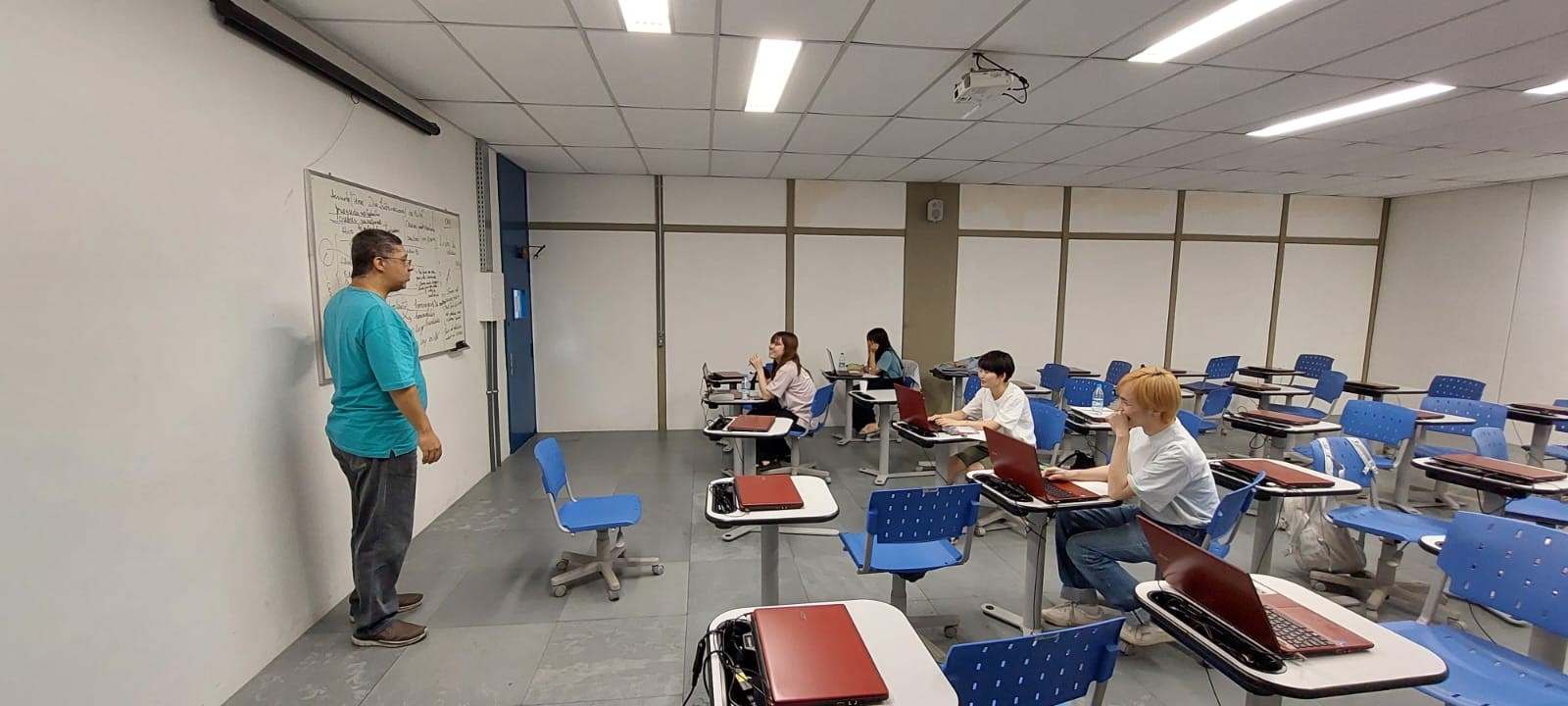
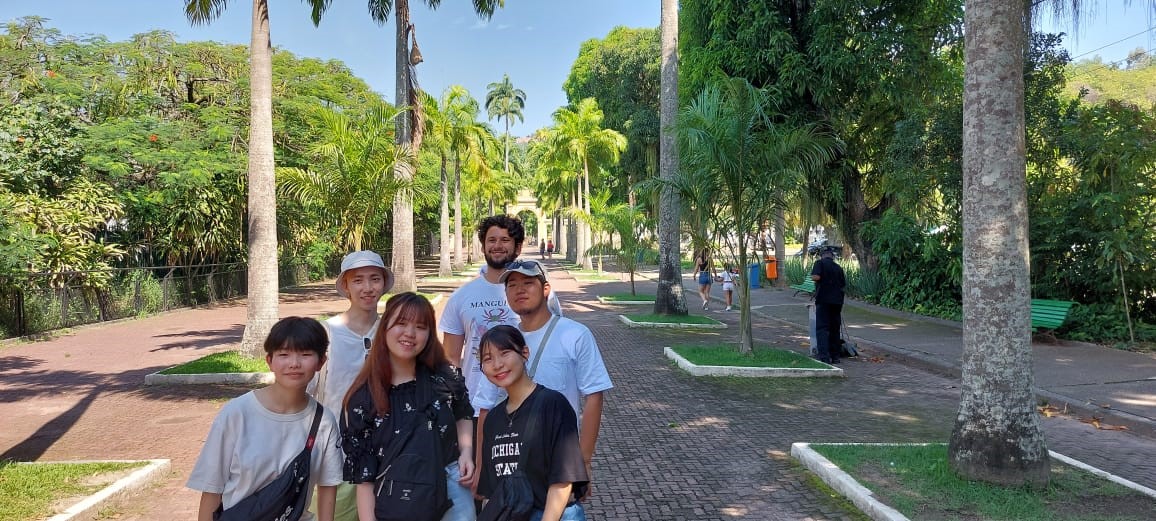
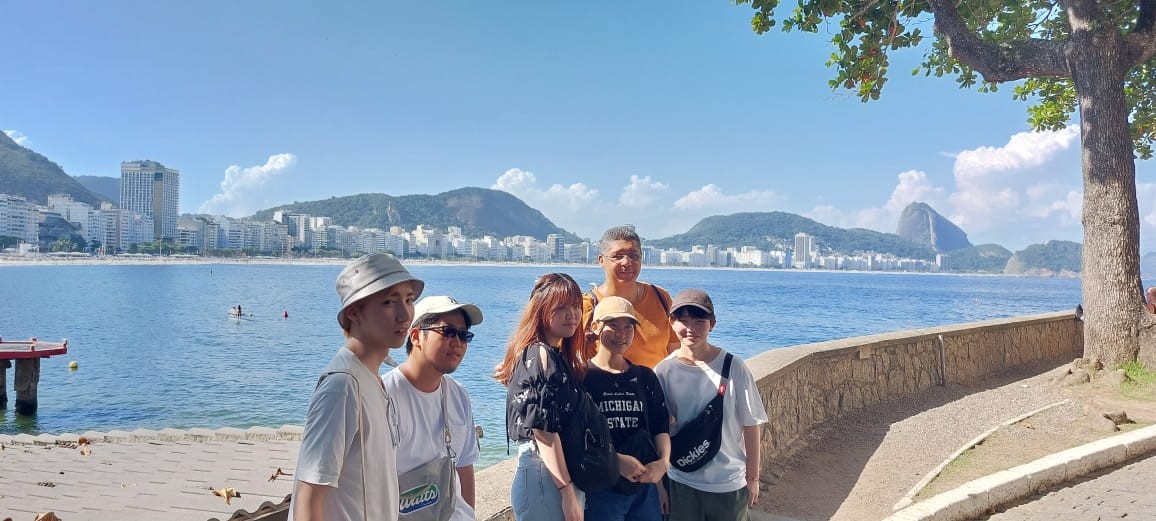
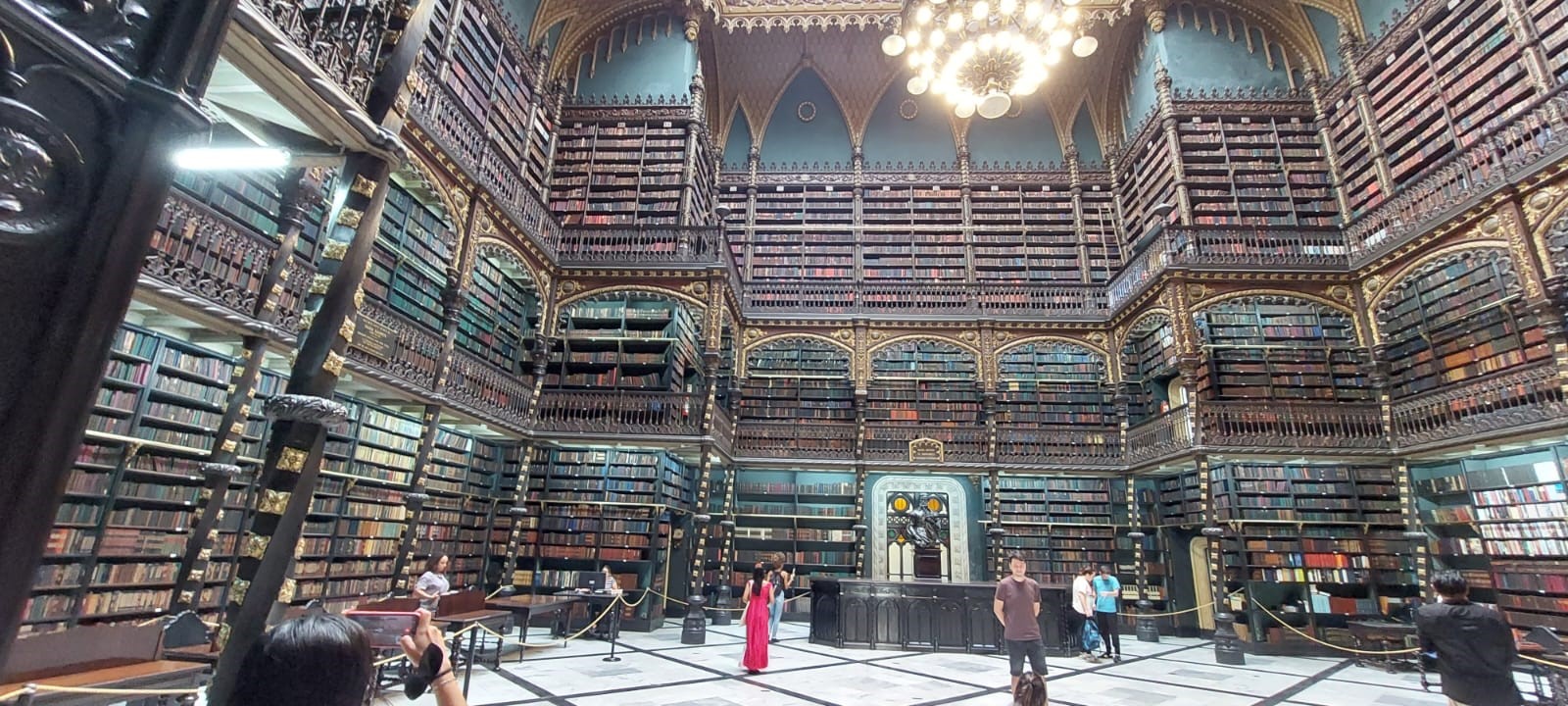
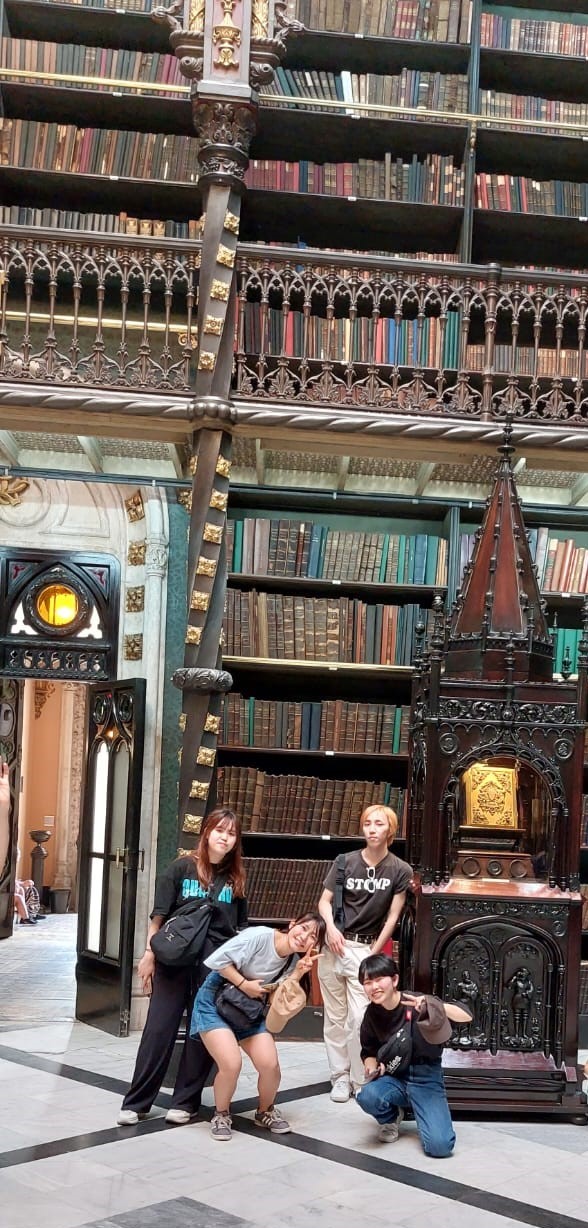
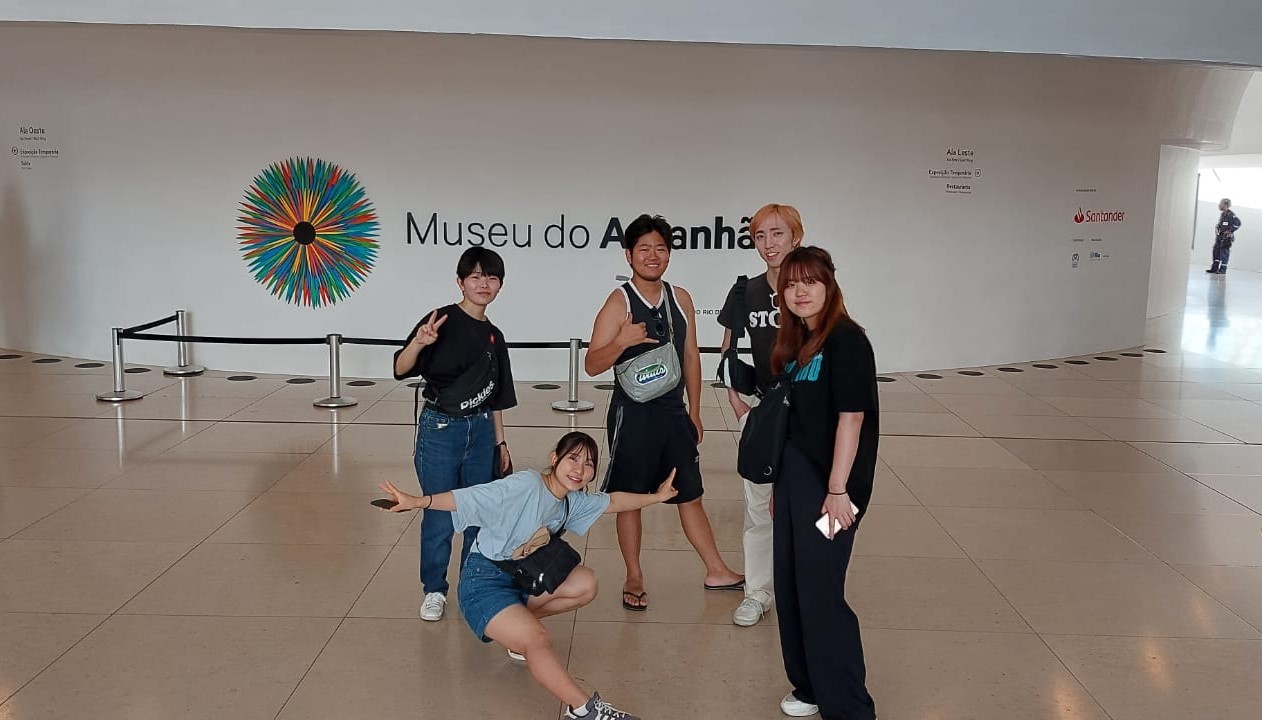
TUFS students at the entrance to the Museu do Amanhã (Museum of Tomorrow)
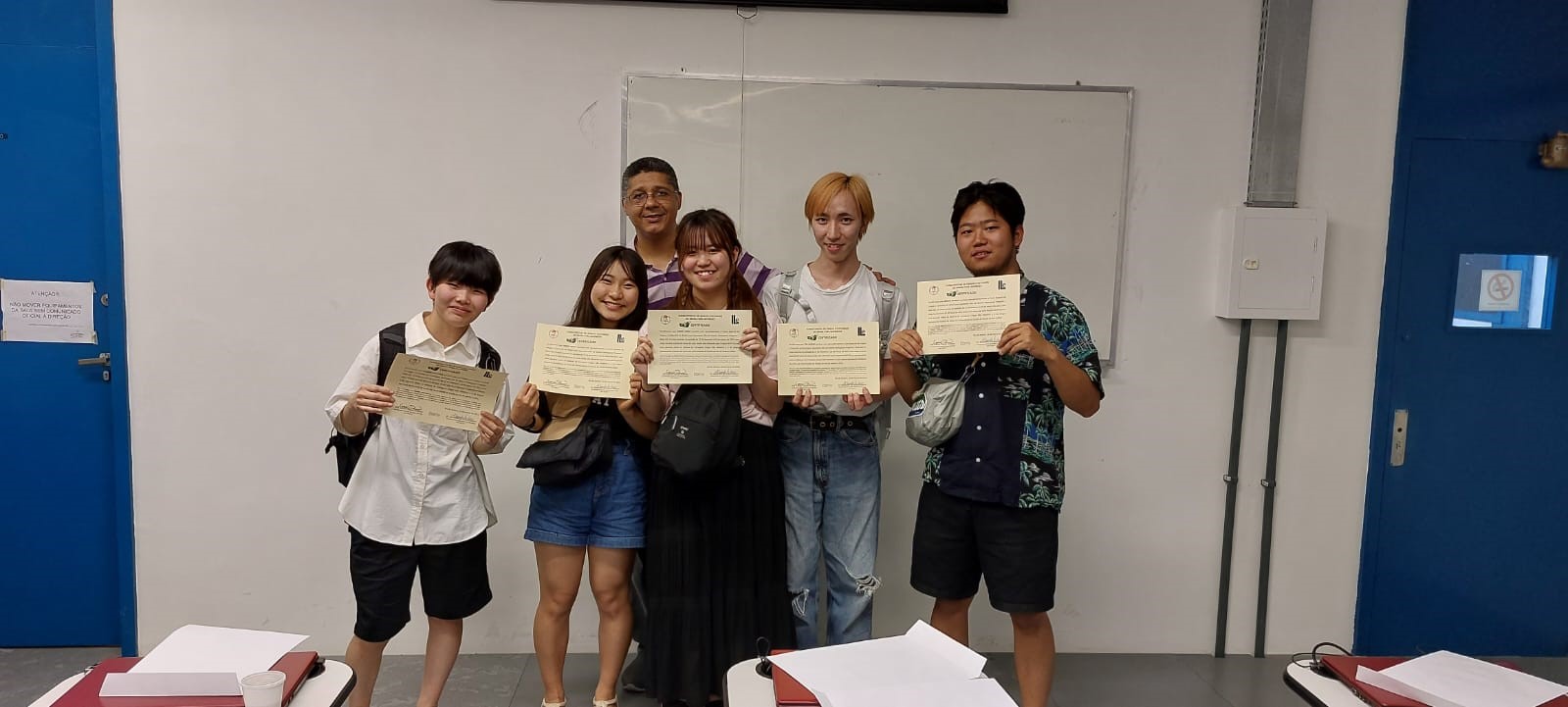
Last day of class: TUFS students with their certificate of completion and Prof. Alexandre in the background
February Activity Report
28 February 2023
Global Japan Office Coordinator
Leonardo Brescia de Sousa Henriques
On February 6, 2023, the Rector of the Rio de Janeiro State University (UERJ), Prof. Mário Sérgio Alves Carneiro, Ph.D welcomed the honorable Consul General of Japan in Rio de Janeiro Mr. Ken Hashiba, in the Rectory's auditorium, to sign a donation term referring to the concession of resources from the Japanese People to the Brazilian People, through the Japanese government program called Grant Assistance for Cultural Grassroots Projects, which was intermediated by the Consulate General of Japan in Rio de Janeiro.
This program aims to deepen mutual understanding and friendship between Japan and other countries.
Among the proposals sent from different countries of the world to the Japanese Government through the aforementioned program, the one from UERJ was selected in the year 2022. The project consists of the implementation of a model room to be installed in the Post-Graduation Program in Law (PPGD) with multimedia resources, videoconferencing, virtual reality, in addition to advanced audiovisual systems and structure for simultaneous interpretation. The room will simultaneously house the JICA Chair, under the agreement signed between UERJ and the Japan International Cooperation Agency — JICA — in March 2022.
The model room project, of interdisciplinary traits, was conceived and developed jointly throughout the year 2022 by the PPGD, the Japanese Department of the Letters Institute and the TUFS Global Japan Office.
Through the above mentioned Japanese Government program, it is expected that the Rio de Janeiro State University will become a hub for Japanese studies in Brazil expanding the understanding of Japan not only at the academic level, but beyond the walls of the University.
The event was attended by representatives of the Consulate General of Japan in Rio de Janeiro, UERJ Pro-Rectors, Directors, Professors and representatives of the International Cooperation Office, in addition to Professors of the Japanese Department and the representative of the Global Japan Office.
Below are some images of the event:
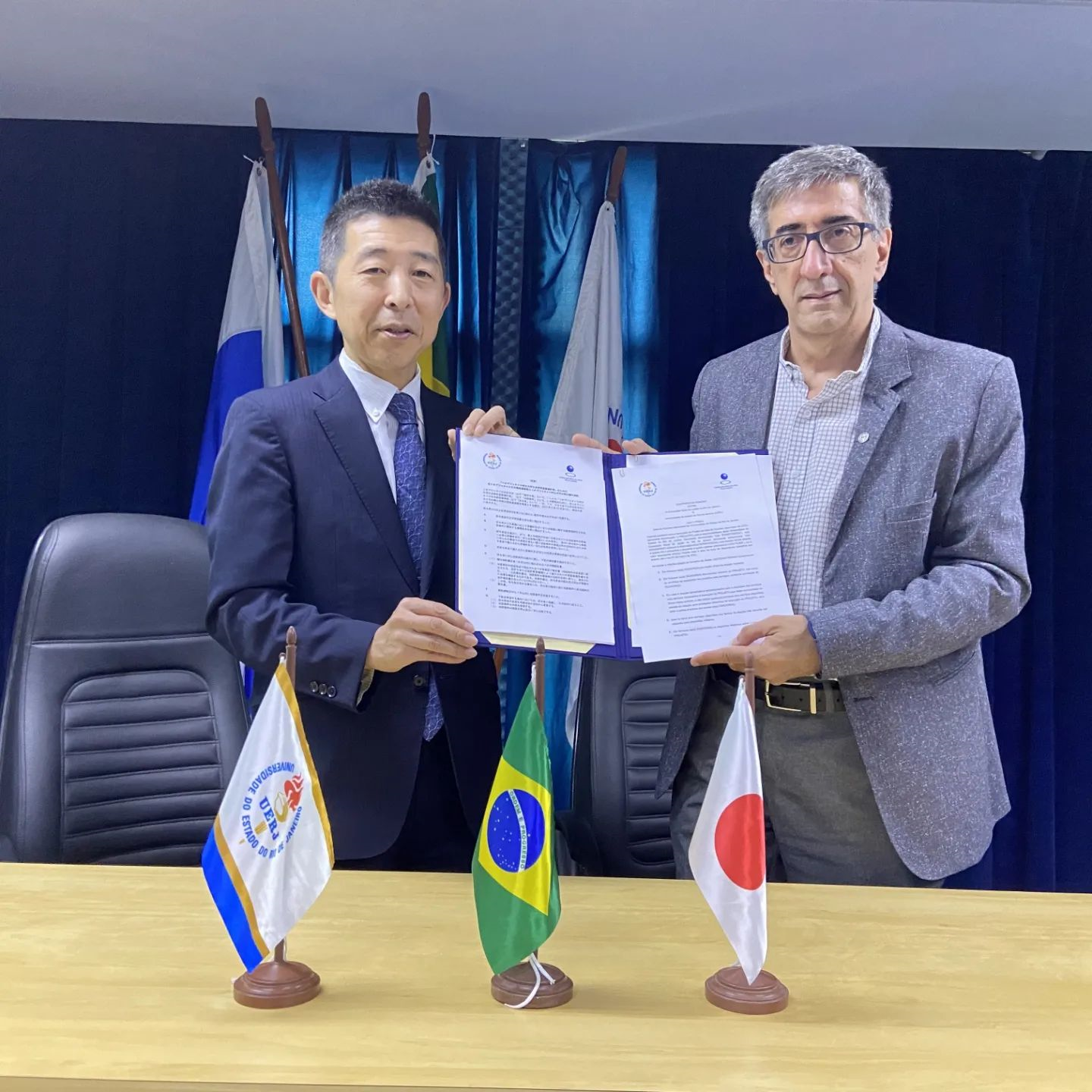
Consul Ken Hashiba, on the left, and the Rector of UERJ Prof. Mário Carneiro with the signed agreement
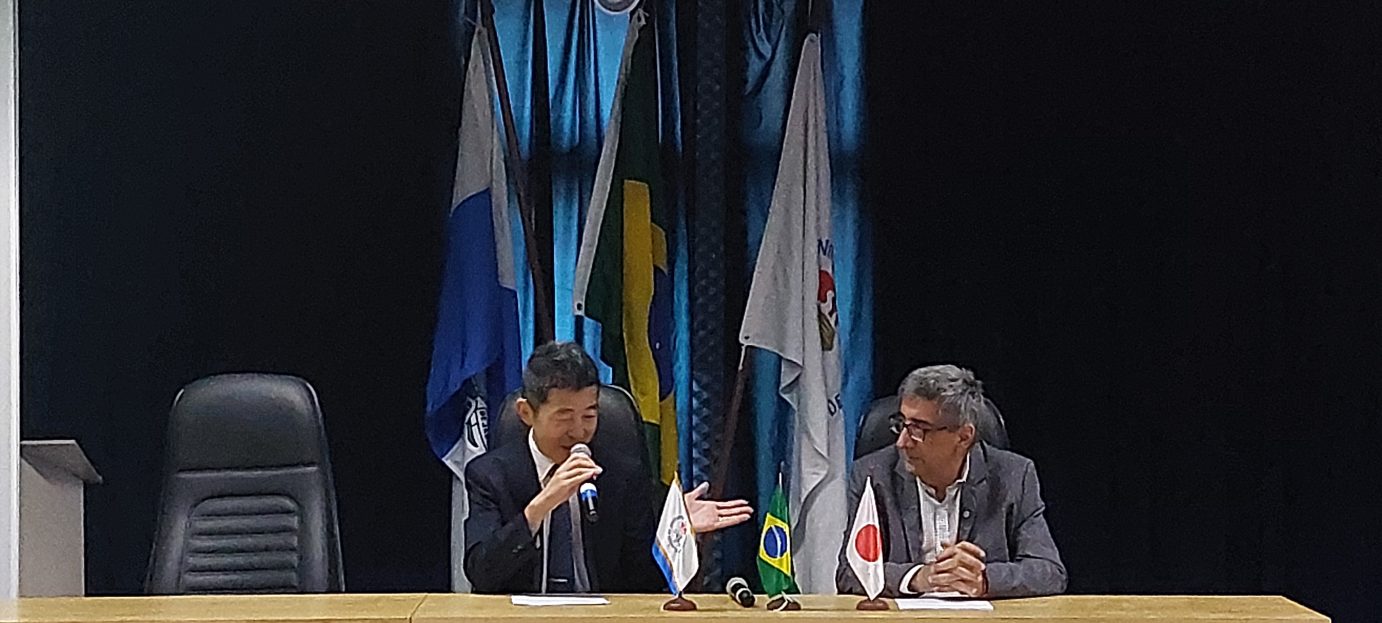
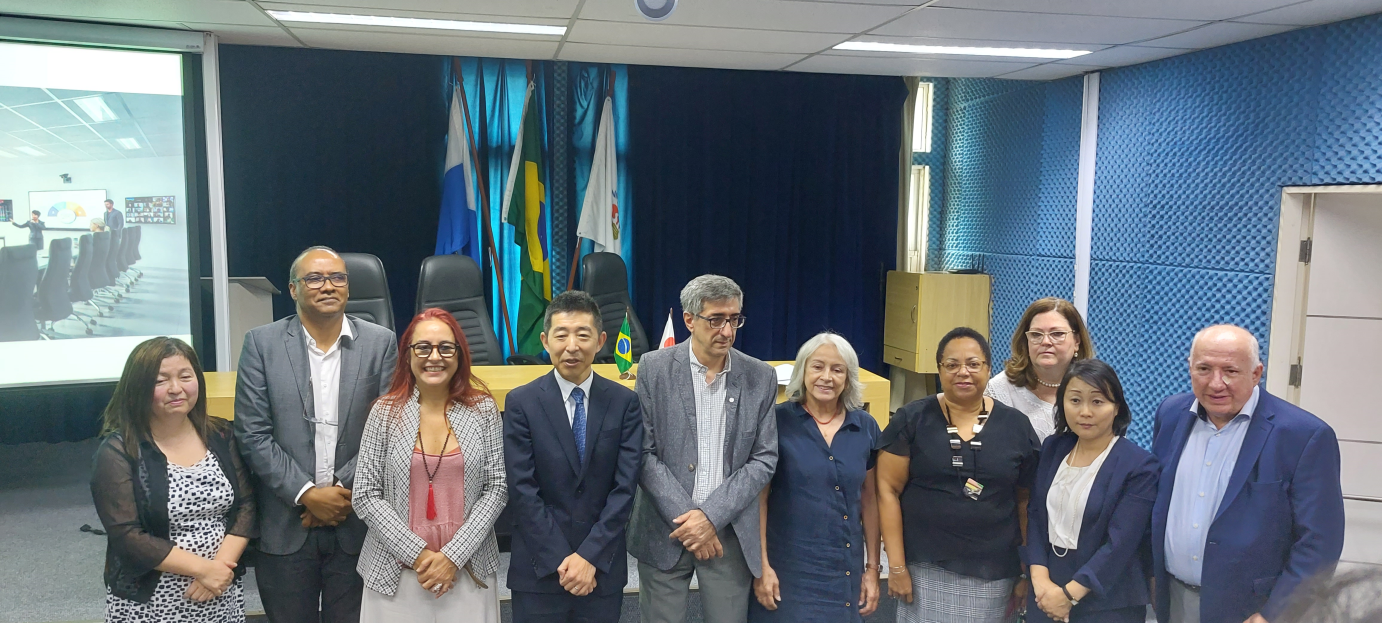
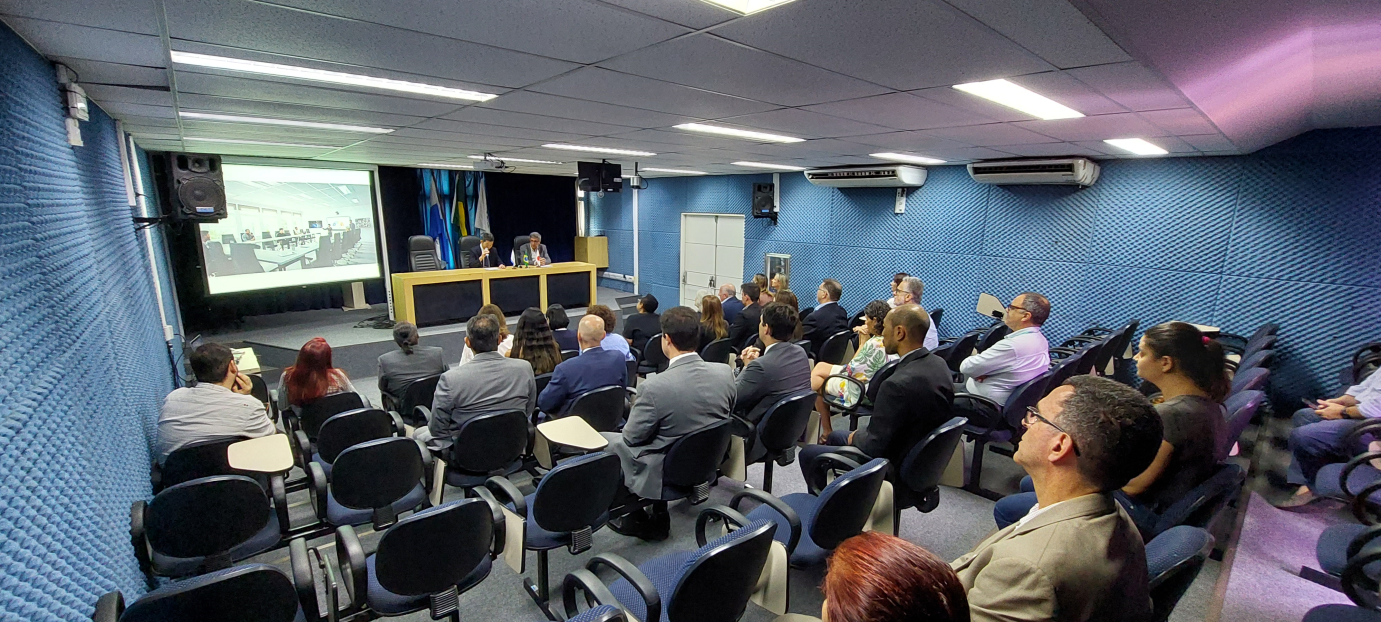
January Activity Report
31 January 2023
Global Japan Office Coordinator
Leonardo Brescia de Sousa Henriques
This month, the first event of the year through the JICA Chair at UERJ took place. The event, held on the 25th, in the Main Hall of the UERJ Law School, consisted of a lecture by Prof. Nobuaki Hamaguchi, Ph.D. from the Kobe University, Research Institute for Economics and Business Administration.
The event was opened by the Rector of the University, Prof. Mario Sergio Alves Carneiro, and soon after, the anthems of Brazil and Japan were performed in an artistic way: the anthems of both countries were performed respectively on electric guitar and violin by students of the Japanese course at UERJ.
The Japan International Cooperation Agency (JICA) invited Prof. Hamaguchi to speak about the theme of his new book entitled Brazil-Japan Cooperation: from Complementarity to Share Value, released in January.
In his lecture, Prof. Hamaguchi highlighted how economic and diplomatic relations between Brazil and Japan were historically complementary, from immigration in the first half of the 20th century, which helped alleviate demographic pressure in the eastern country, to Japanese industrial investments in Brazil, especially in the areas of cellulose, mining, steel and motor vehicles, also mentioning the importation of Brazilian soybeans and the dekasegi phenomenon, as Brazilians of Japanese descent who chose to immigrate and work in Japan are known.
After the lecture, two professors of the International Economics area made comments on the subject: first Professor João Eduardo de Alves Pereira from the UERJ Law School and then Professor João Carlos Ferraz from the Institute of Economics at the Federal University from Rio de Janeiro.
In addition to the lecture, there was also a ceremony for the donation of books from the Nippon Foundation to the UERJ Legal Sciences library. The ceremony was chaired by the Consul General of Japan in Rio de Janeiro, Mr. Hiroshi Teramichi, who read the donation letter sent by the president of Nippon Foundation, Mr. Yohei Sasakawa.
The donation of books by the Nippon Foundation strengthens UERJ's international partnership scene as it encourages academic study in the legal area with a focus on Japan, opening up new possibilities for undergraduate and graduate research. It is worth remembering that in Japan there are many Brazilian residents who need legal assistance, which makes the constant development of the area even more relevant.
In addition to Rector Mario Carneiro, other representatives of UERJ's senior management were present, such as the Director of International Cooperation Office, Prof. Cristina Russi, and the Law School Director, Prof. Heloisa Helena Barboza. Representatives of the Consulate General of Japan in Rio de Janeiro and JICA were also present, in addition to professors and students from the University.
At the end of the event, participants were invited to participate in an informal meeting in an adjacent room where appetizers were served.
Below are some images of the event:
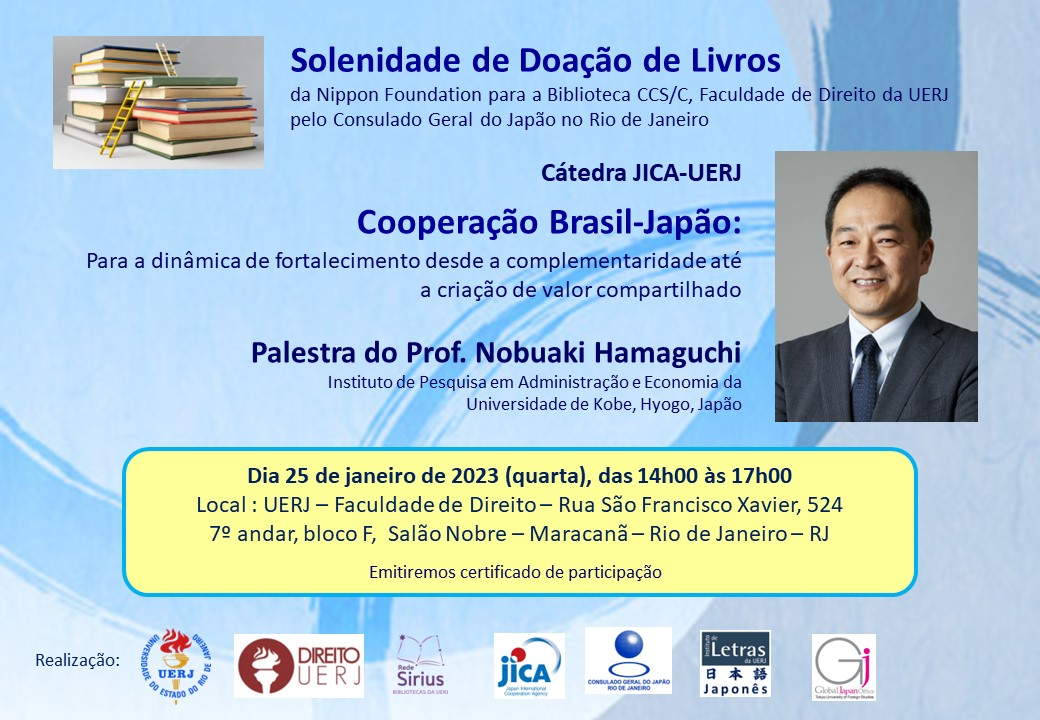
Poster of the event by Prof. Elisa Massae Sasaki
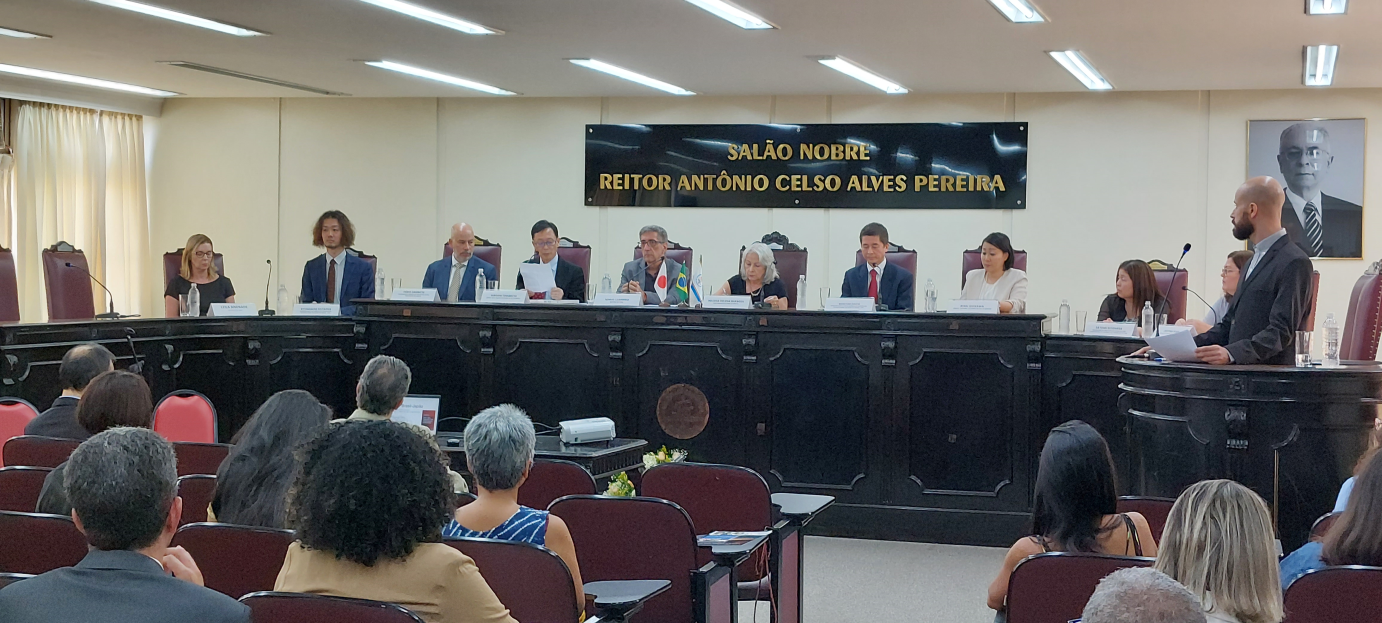
UERJ, JICA and Consulate General of Japan representatives at the book donation ceremony
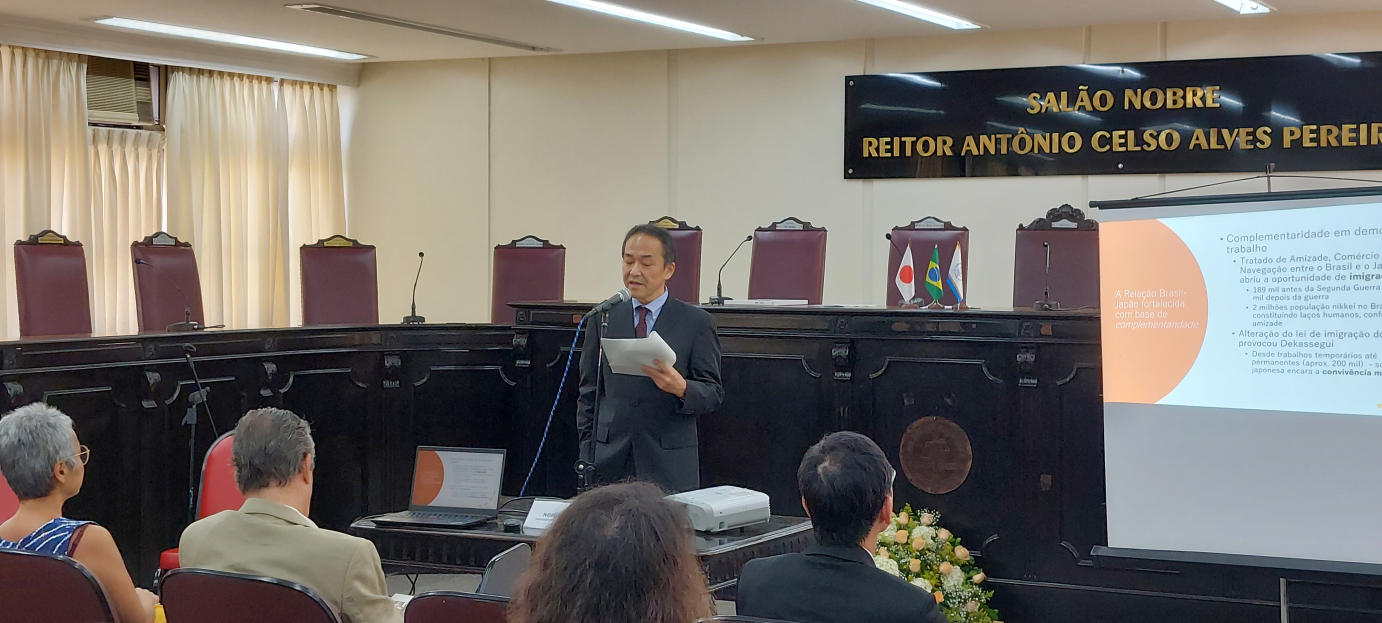
Prof. Nobuaki Hamaguchi during his lecture
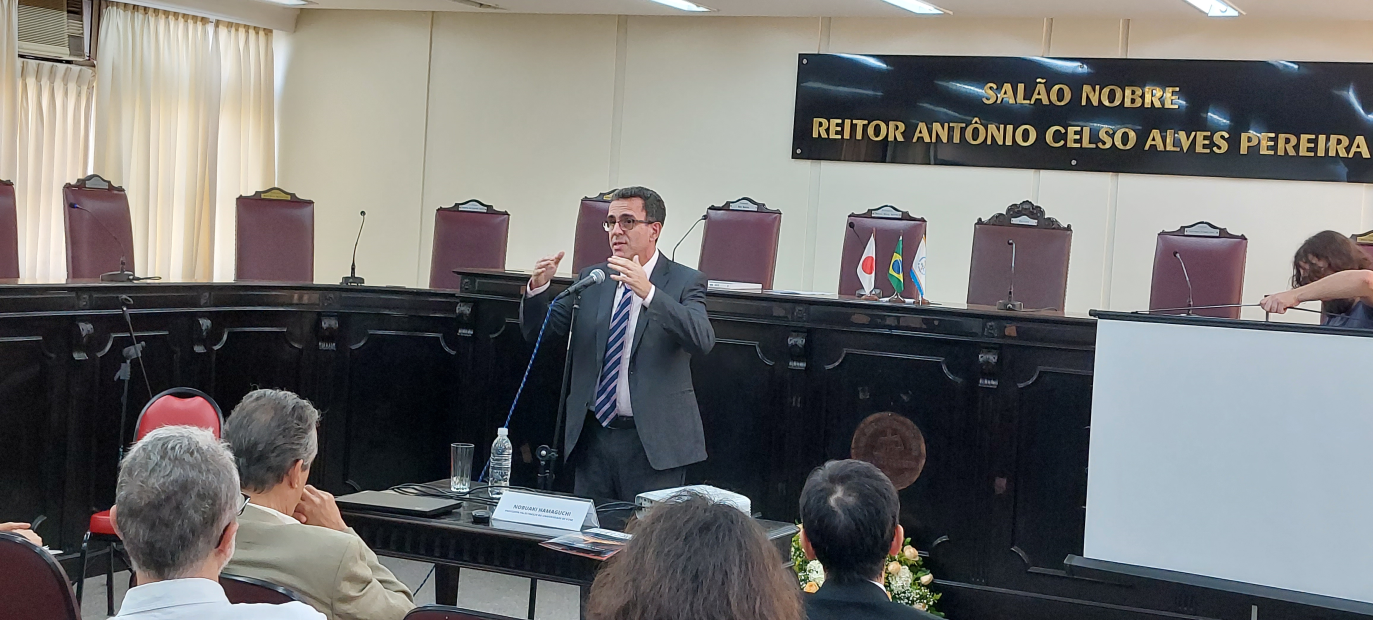
Commentator: Prof. João Eduardo de Alves Pereira
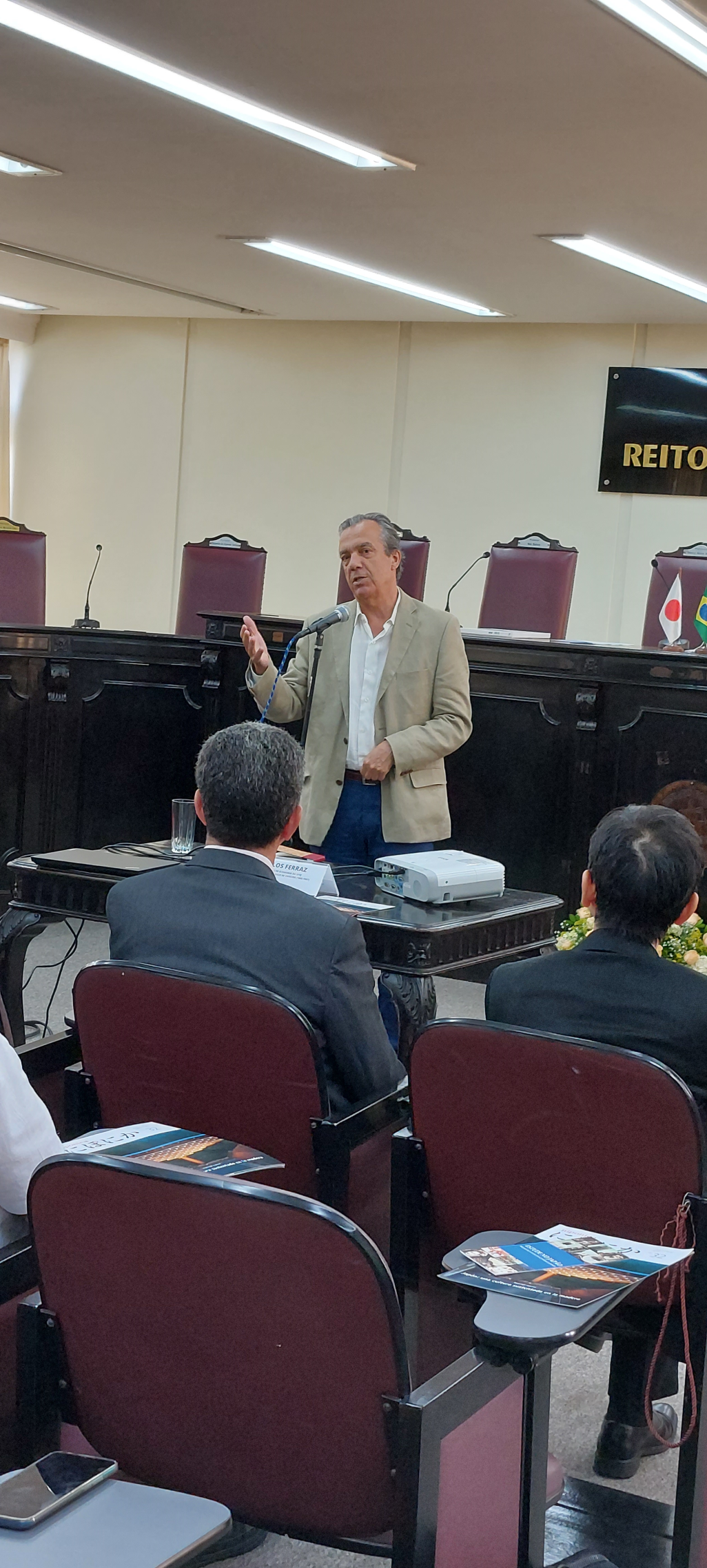
Commentator: Prof. João Carlos Ferraz
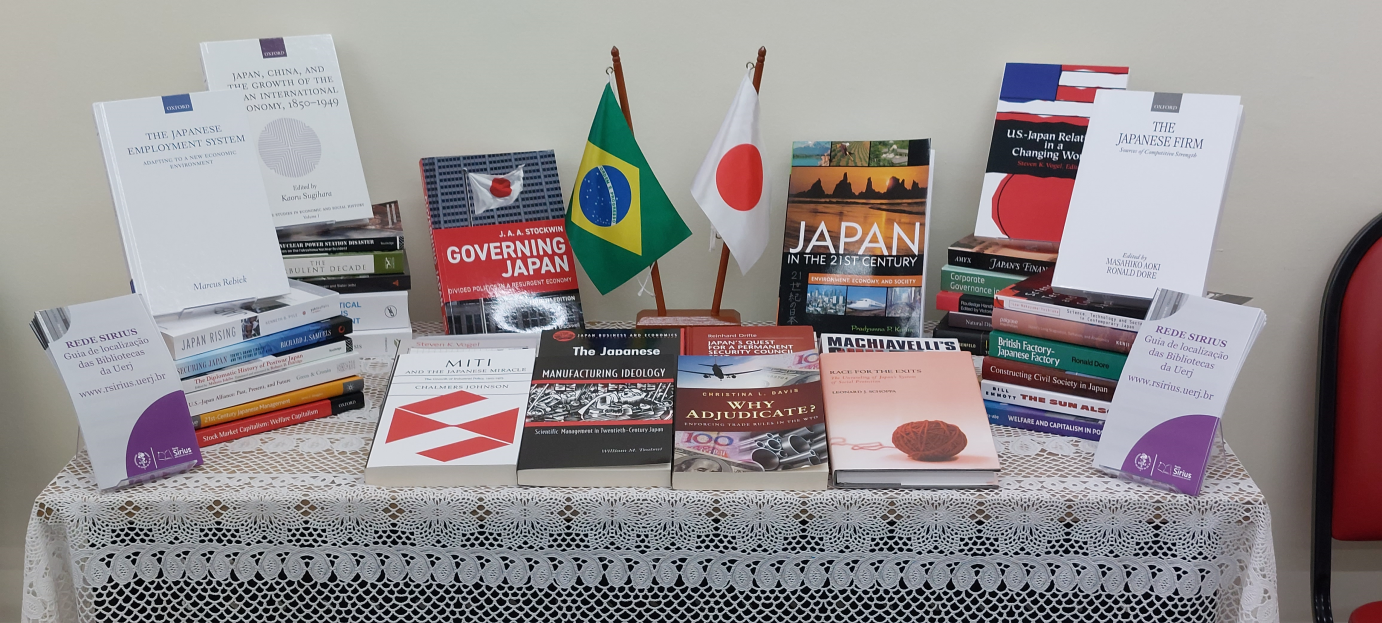
Some of the donated books
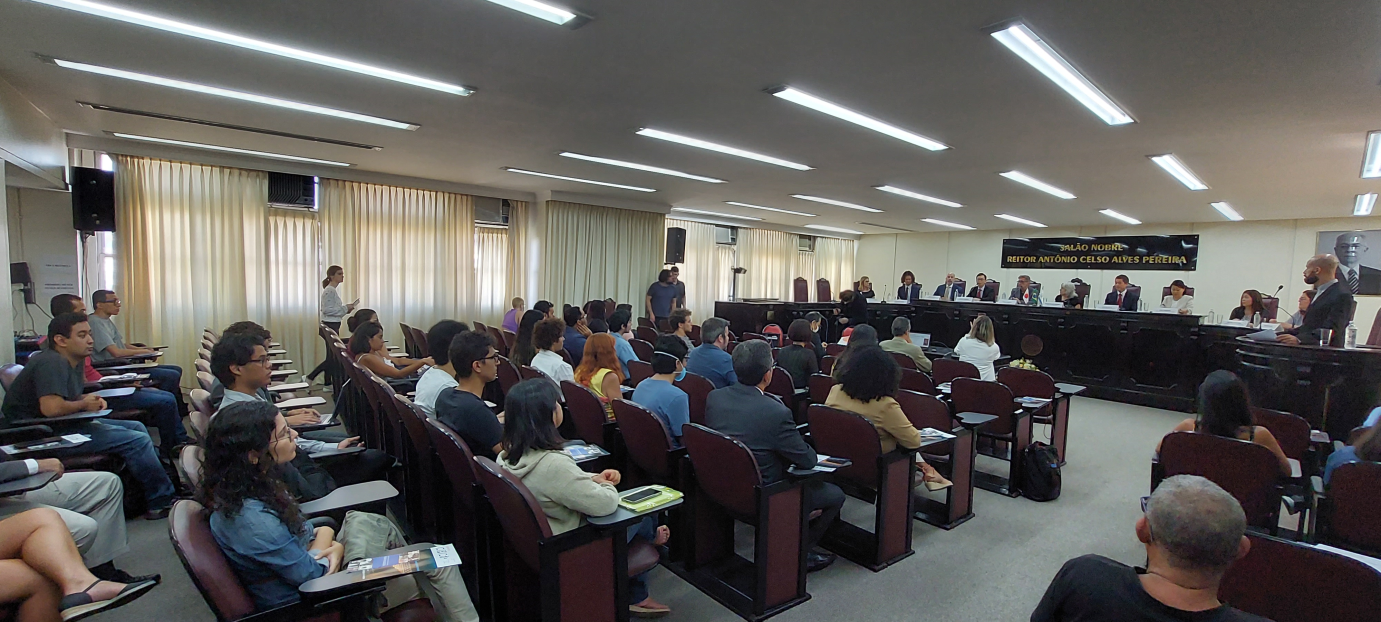
The audience
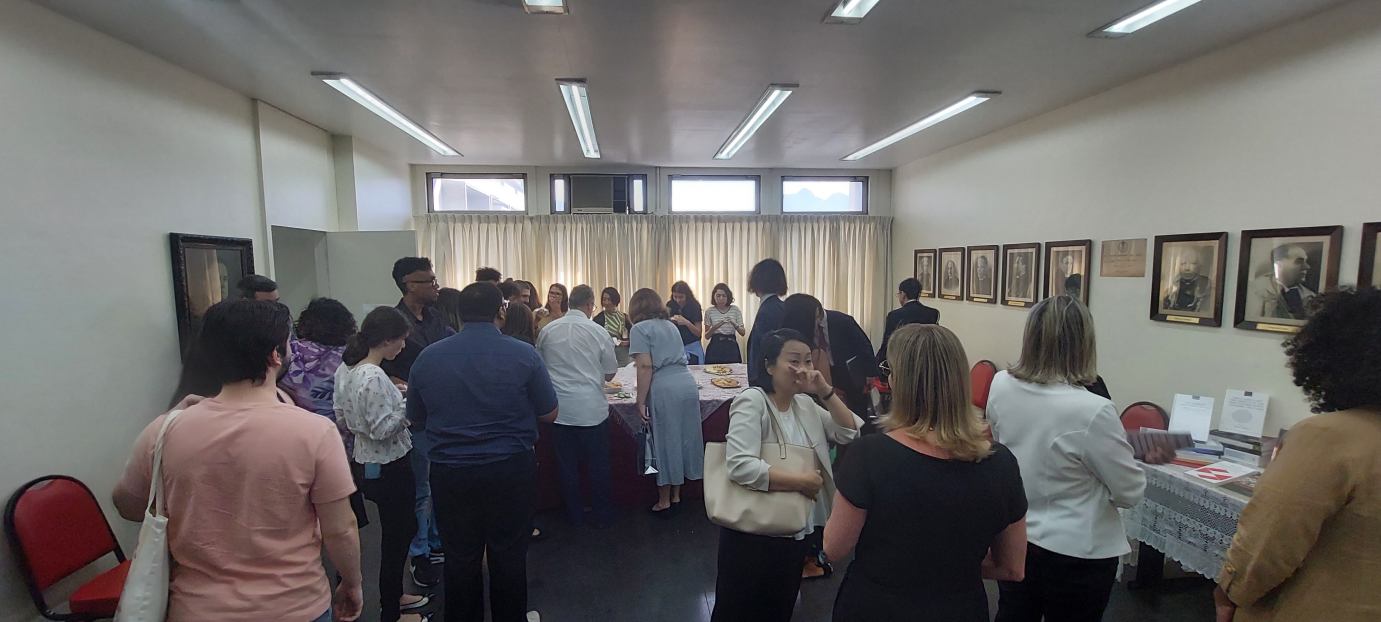
Informal meeting after the event
December Activity Report
31 December 2022
Global Japan Office Coordinator
Leonardo Brescia de Sousa Henriques
In December 2022, the UERJ Japanese Department along with the GJO organized the last event of the year, which took place on 7th. The event called “Bolsa de Estudos no Japão — UERJ 2022: Programa de Intercâmbio e Experiências” (Scholarship in Japan — UERJ 2022: Exchange Programs and Experiences) counted on the support and participation of representatives of the Consulate General of Japan in Rio de Janeiro and of the Japan International Cooperation Agency (JICA).
The main objective of the event was to present both the projects of the Japanese Department and the opportunities of exchange programs which UERJ students can apply for. It had as its target audience mostly the students who recently entered UERJ, as well as those who entered the University during the pandemic.
The event was opened by the Coordinator of the Japanese Department, Prof. Satomi Takano Kitahara, followed by the presentation of the Department activities and current projects by Prof. Elisa Massae Sasaki and Prof. Elisa Figueira de Souza Corrêa.
After that, the event’s first session named “Exchange Programs in Japan” started. Here, the Cultural Advisor at the Consulate General of Japan in Rio de Janeiro, Ms. Gabriela Yussa, spoke about the Japanese Government Scholarships offered by MEXT. Then, the Senior Representative of JICA in Brazil, Ms. Reiko Kawamura, made a presentation on the JICA Scholarship and Training Program in Japan. At last, the Coordinator of the Global Japan Office of TUFS at UERJ, Leonardo Brescia de Sousa Henriques, talked about the UERJ's cooperation agreements with Japanese Institutions and the current programs and types of scholarships students can apply for.
Thereafter, the second session named “Experiences of Studying in Japan” took place. UERJ current and former students who have participated in an exchange program at a Japanese university reported their experiences. The first one to talk was Paula Fernanda Martins Guerra Braga, who participated in the Kwansei Gakuin online Exchange Program in 2021. Then, Amanda Barros Platana made her presentation. Amanda had two experiences in Japan: first she studied at Chiba University, in 2014, for two academic semesters as an undergraduate exchange student, and later from 2018 to 2021 at TUFS while pursuing a Master degree. Next, Lívia Yumi Yomura talked about her experience at Hokkaido University in 2021/2022 and, at last, Izabela de Oliveira Silva reported her experience at Kanazawa University, as an undergraduate exchange student.
Closing the event, the two exchange students from TUFS at UERJ, Yuki Oishi and Naoki Tsukamoto, made very amusing presentations in Portuguese about their experiences in Rio, including trips, studies, friendships, cultural differences among others.
The event room was full of students from different courses highly motivated to study in Japan. Here are some images of the event:
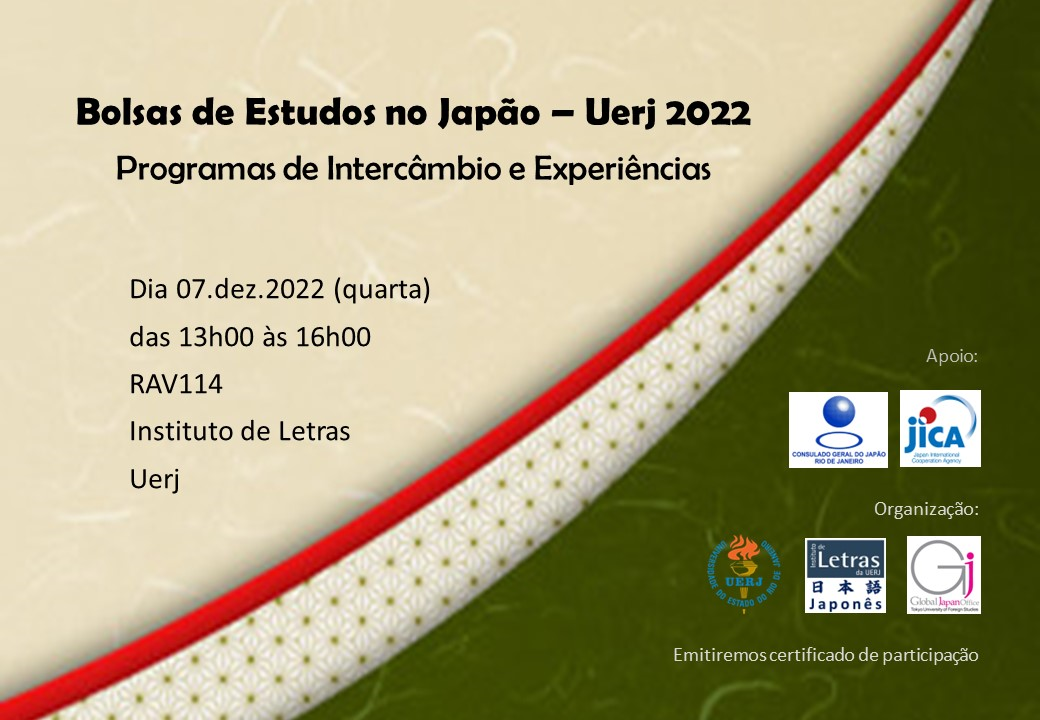
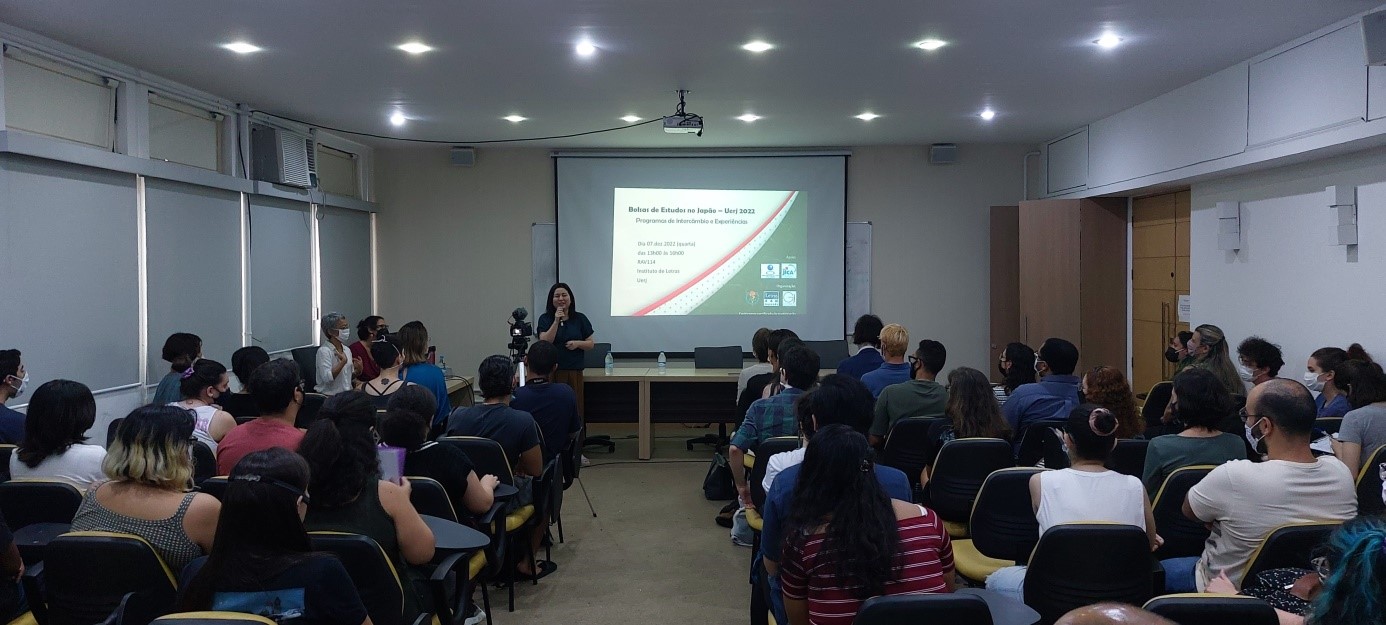
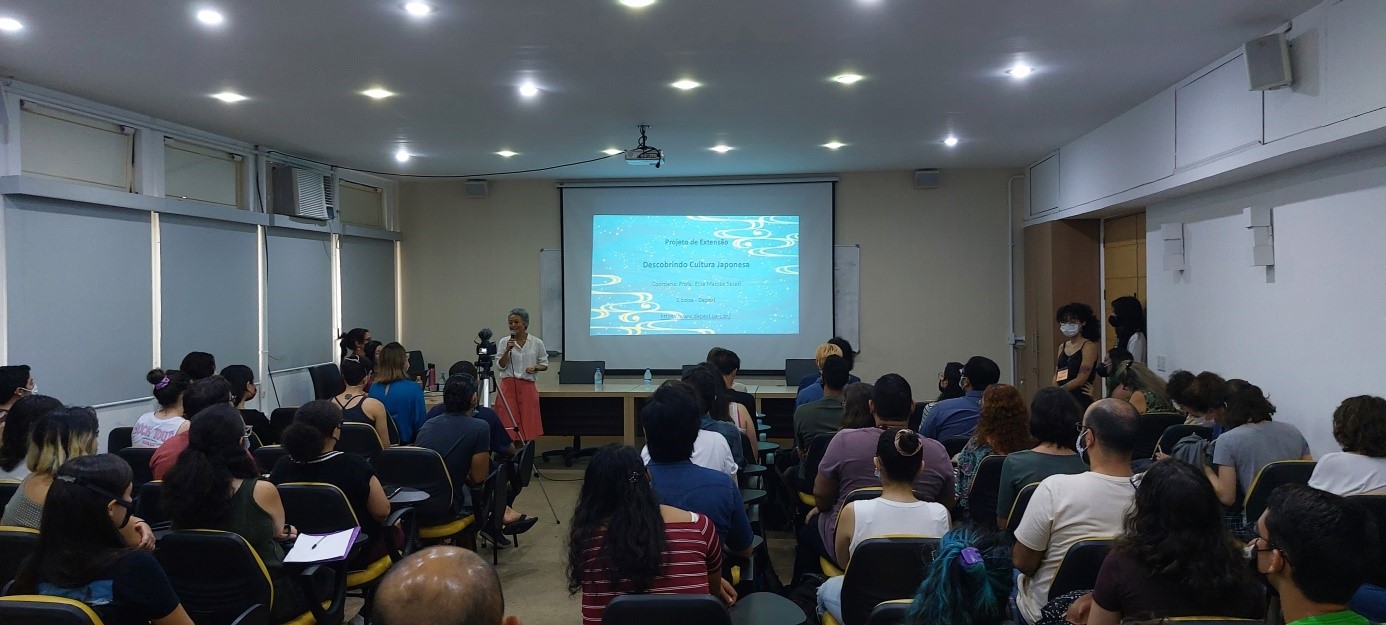
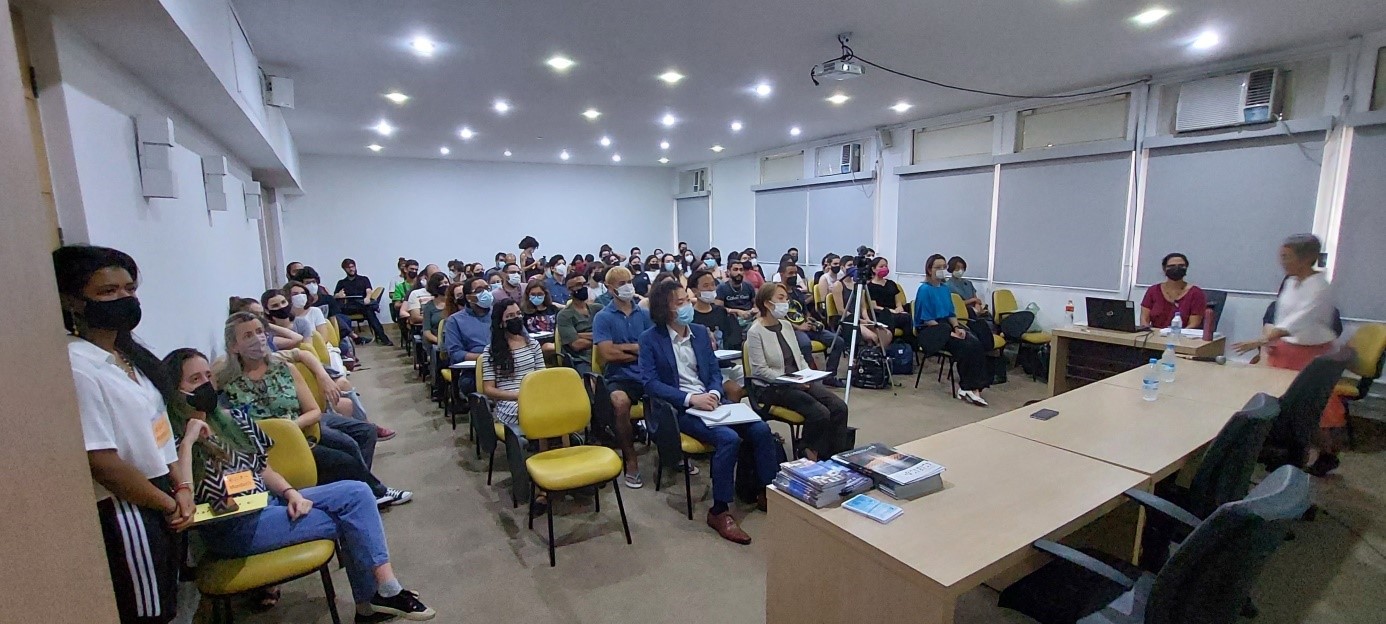
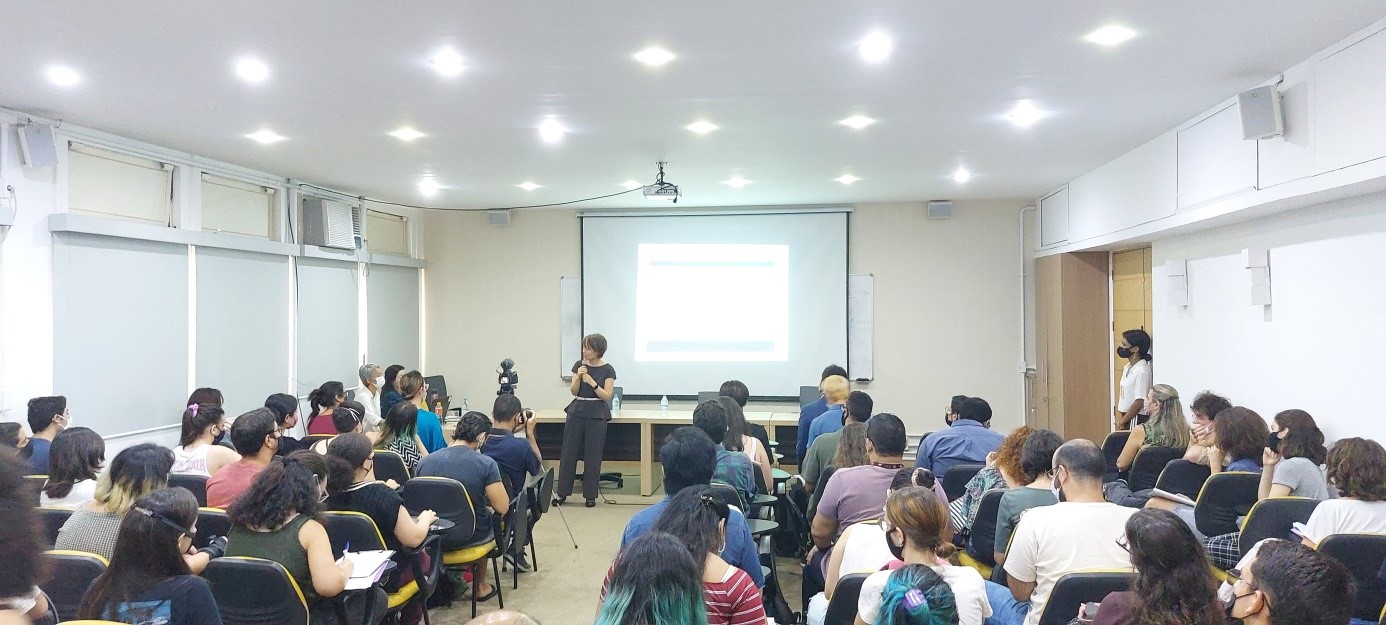
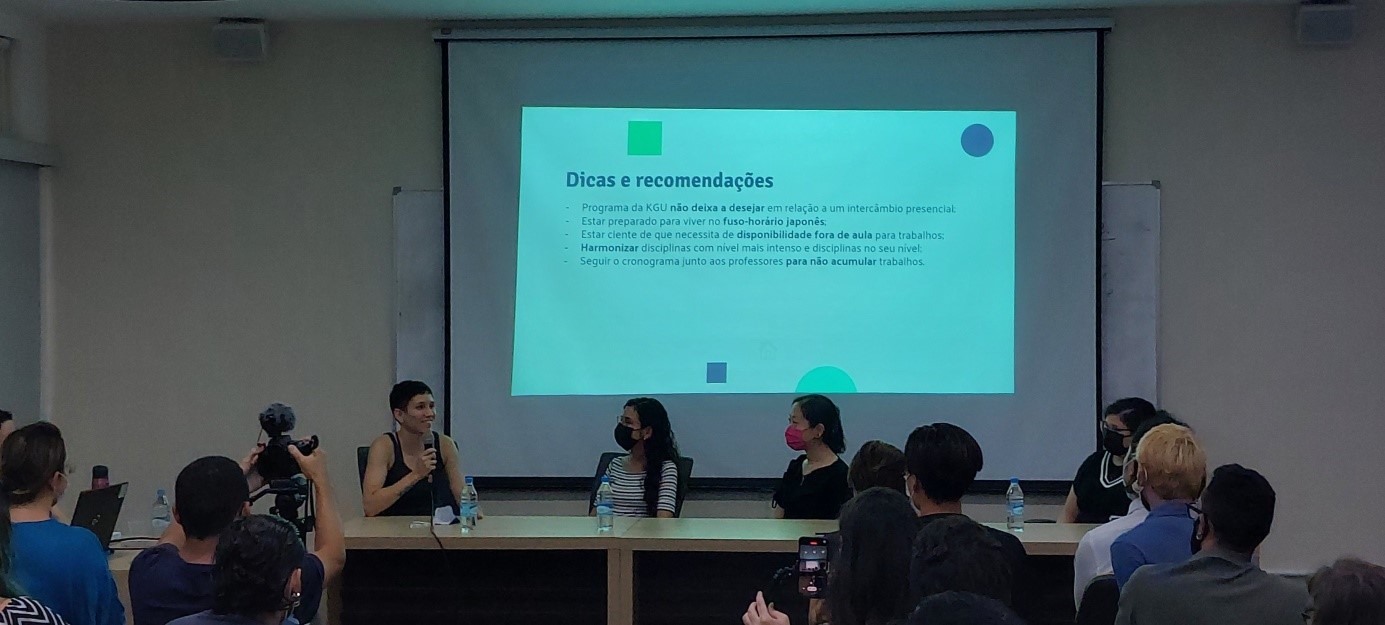
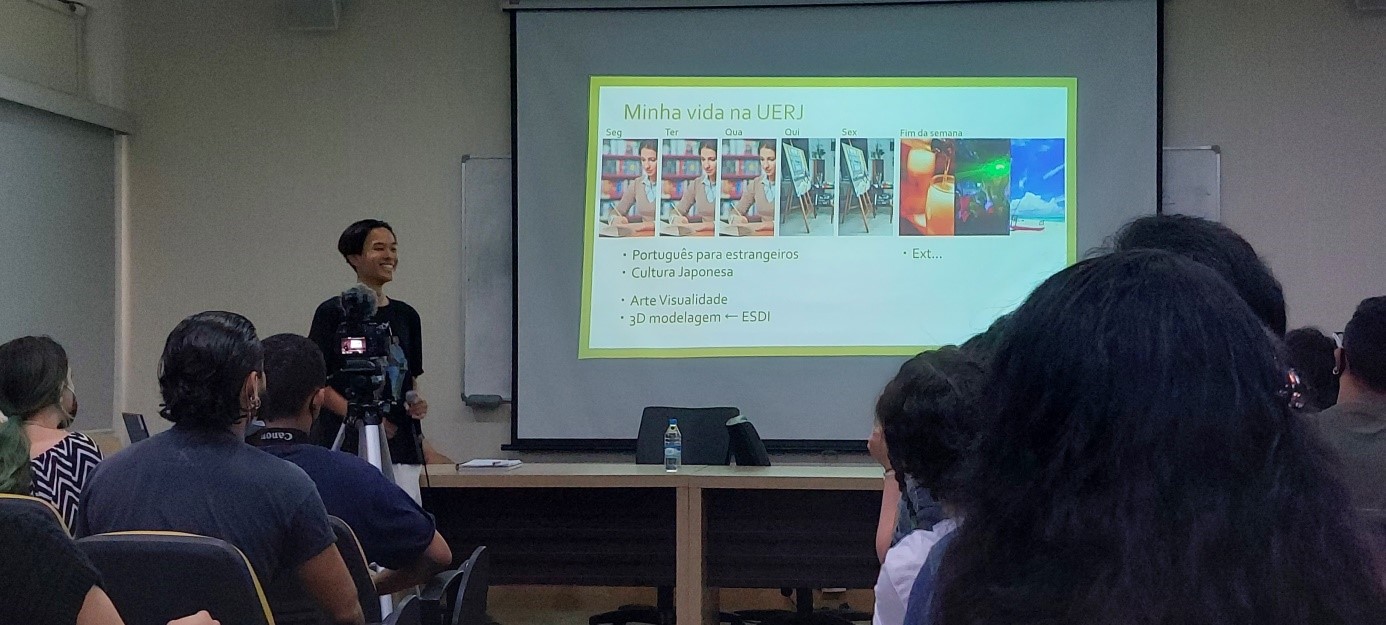
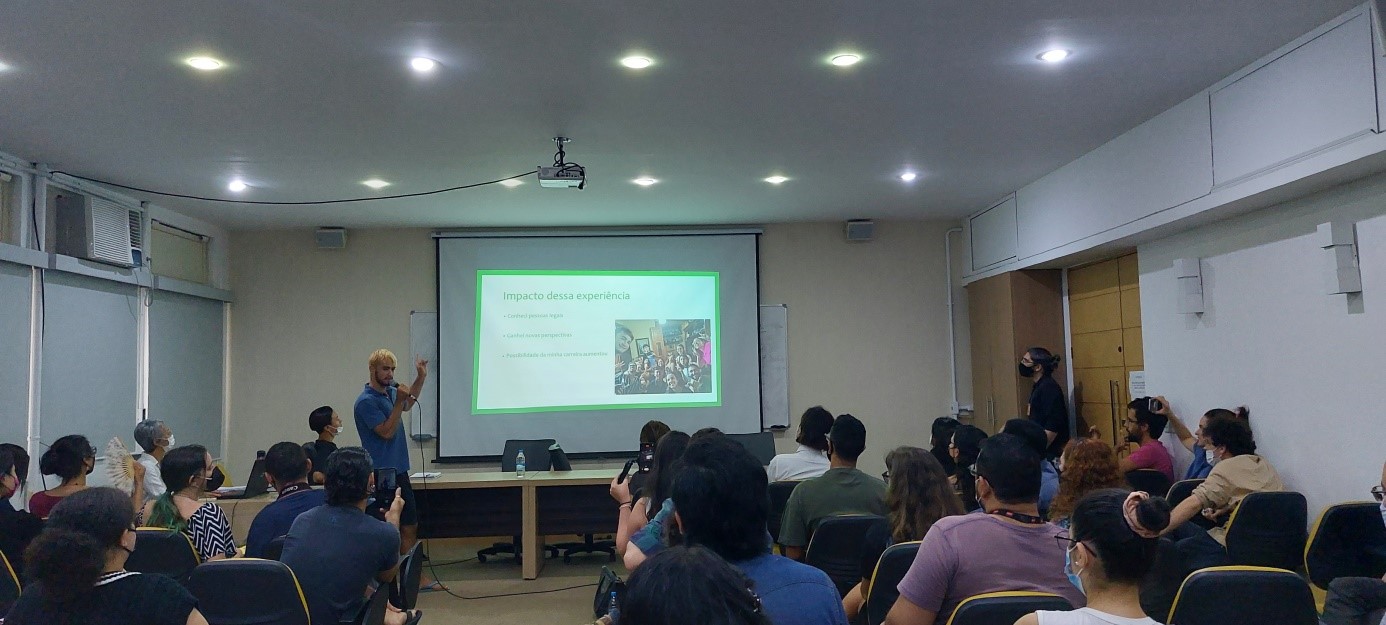
November Activity Report
30 November 2022
Global Japan Office Coordinator
Leonardo Brescia de Sousa Henriques
This month, the 31st edition of the event called “UERJ sem Muros” (UERJ without walls) took place at the University as part of the activities of the 24th Extension Exhibition. “UERJ sem Muros” is an annual event that mobilizes the entire University with the aim of presenting to society the academic production carried out in the various areas of knowledge, involving teaching, research, extension and culture. The in-person event, in which several cultural performances and exhibitions of projects are presented, was resumed this year, after two years of suspension due to the pandemic.
Among the projects presented, five of them were organized by the UERJ Japanese Department, which are: (1) Discovering Japanese Culture; (2) ELONihon — Media Studies; (3) Tutoring in Japanese Language 1; (4) Initiation to Teaching — Center for the Elaboration of Materials for Teaching Japanese Language and Culture in Brazil; and (5) LICOM — Languages for the Community (Japanese).
The Extension Project Discovering Japanese Culture is coordinated by Prof. Elisa Massae Sasaki. It aims to interview students who have already participated in an exchange program at Japanese Universities, in order to record their experiences which will form a collection of students' memories and will preserve a part of the history of UERJ's internationalization process. The project will also help future exchange students to prepare to study abroad based on the experience of former students.
The Extension Project ELONihon — Media Studies, coordinated by Prof. Janete da Silva Oliveira, has among its objectives the development of activities related to the learning of Japanese, focusing on the production of contents that present the language in a playful way for students and the general public. The activities include the promotion of lectures and events through the YouTube channel; the issuing of news and events related to Japanese media, with special attention to Japanese cinema and literature; and a podcast on Japanese media and literature.
The activities of the project can be found on the following social networks: @elonihon (Instagram); @EloNihon (Twitter) and www.elonihon.com (blog).
The Tutoring in Japanese Language 1 is coordinated by Prof Elisa Figueira de Souza Corrêa. The project consists mainly in guiding a senior student to give support to freshmen who have difficulty in learning Japanese and wish extra support outside of the classroom.
The Initiation to Teaching Project — Center for the Elaboration of Materials for Teaching Japanese Language and Culture in Brazil, coordinated by Prof. Elisa Massae Sasaki, carries out activities such as bibliographical survey of Japanese Culture materials, the search for academic articles and books on Japanese studies and joint discussions with scholarship students who already have experienced teaching in the Supervised Japanese Language Internships to, based on their experiences in high schools, prepare didactic materials on Japanese culture capable of meeting their demands.
Finally, the LICOM — Languages for the Community is a Letters Institute project which aims to spread the teaching of eight foreign languages in Rio de Janeiro, including Japanese. The Japanese course counts on two scholarship students guided by the coordinator Prof. Satomi Takano Kitahara. The Japanese course is divided into four levels and currently has a total of five classes that serve the community inside and outside UERJ.
Below are some images of the presentations of the projects at the “UERJ sem Muros”:
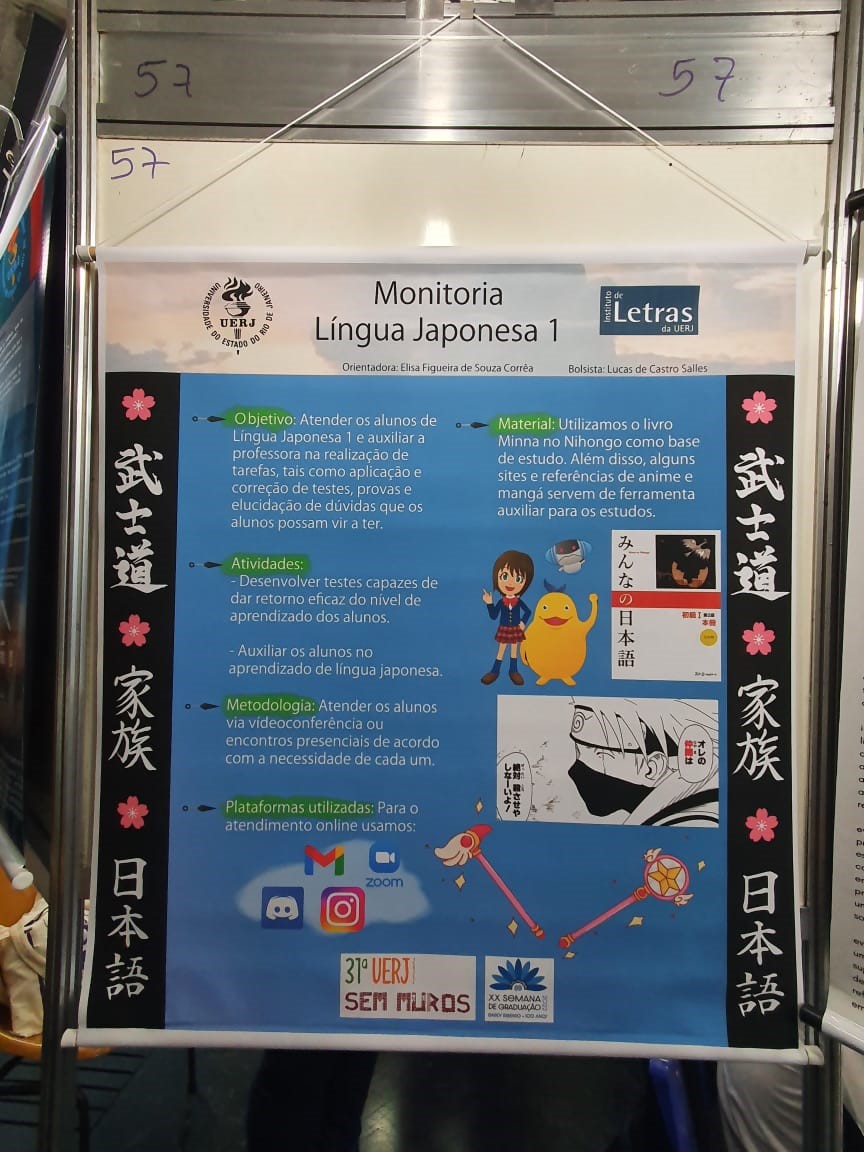
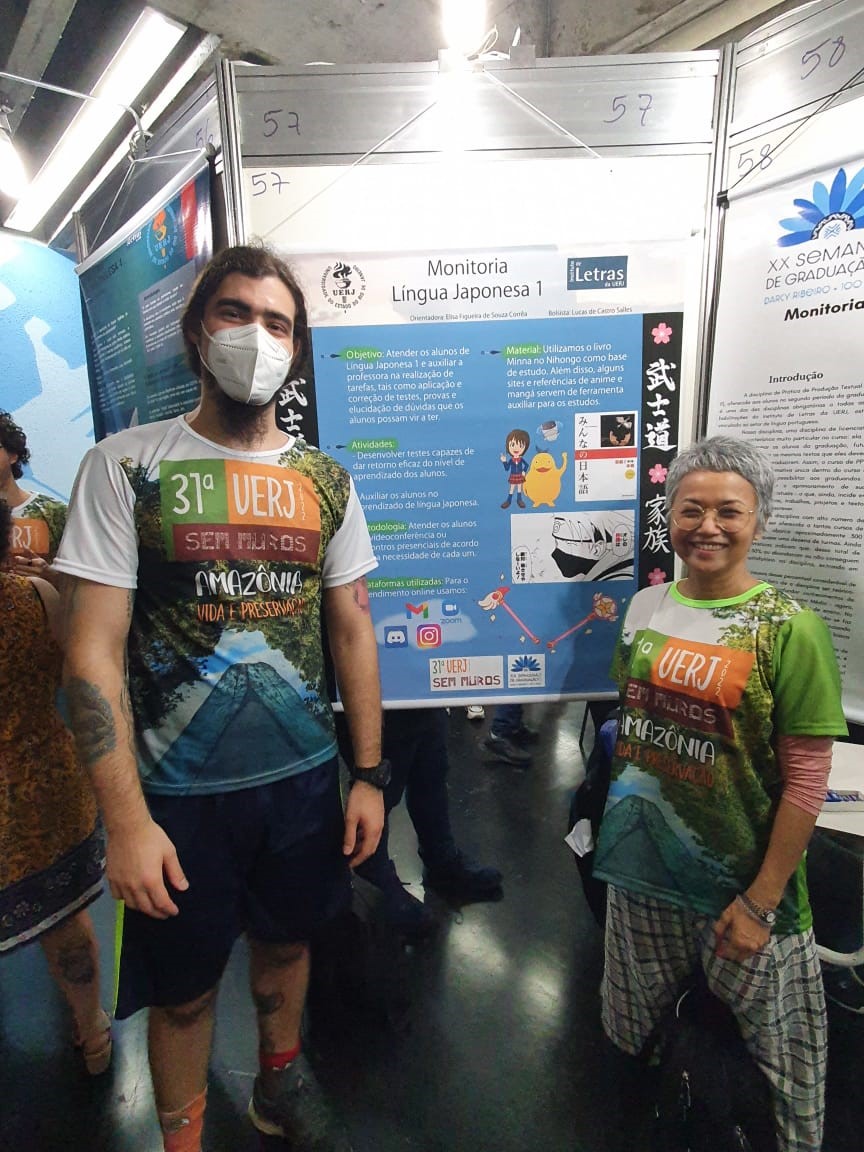
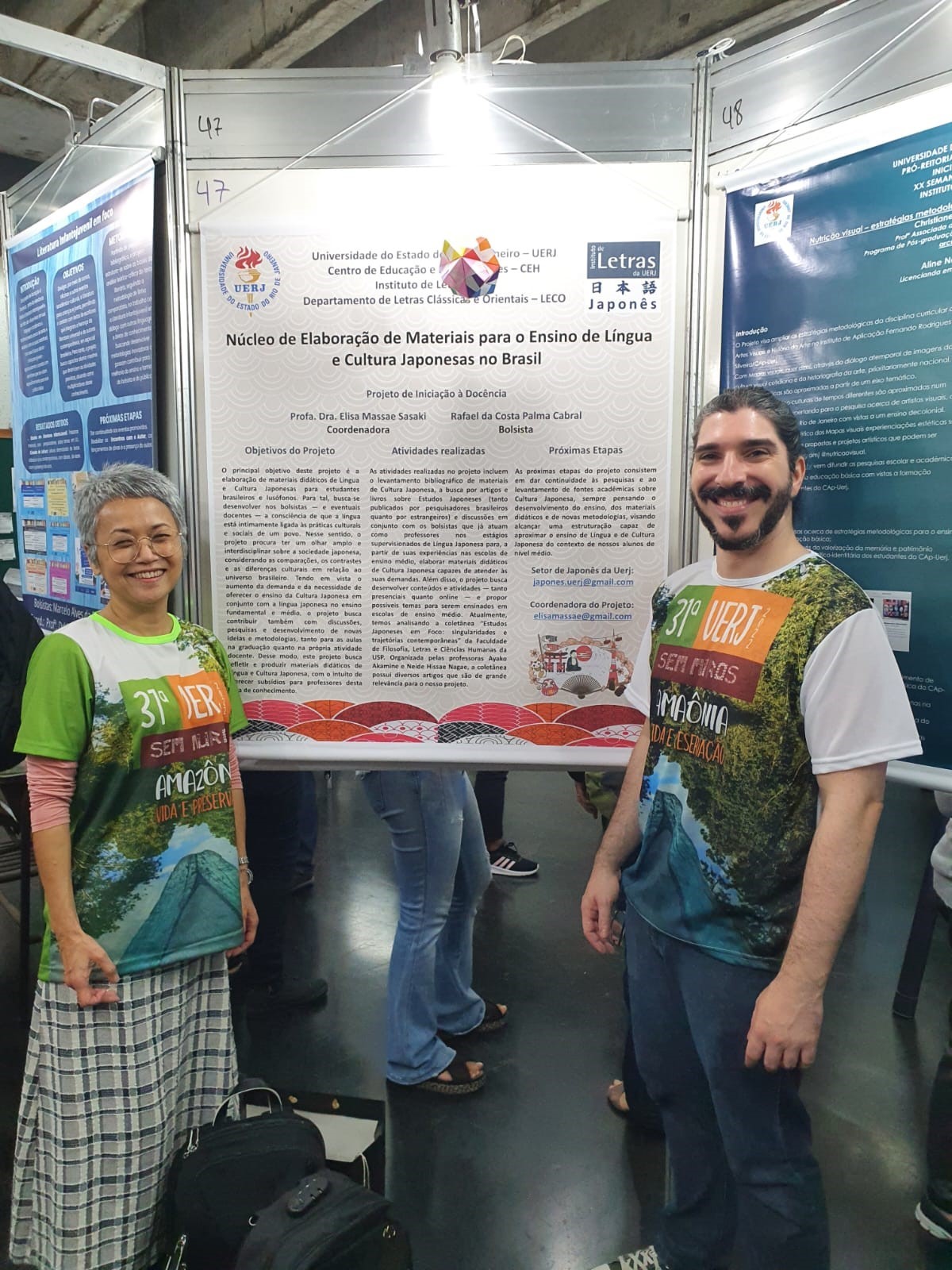
October Activity Report
31 October 2022
Global Japan Office Coordinator
Leonardo Brescia de Sousa Henriques
This month was marked by elections in Brazil at the national level, through which new State Deputies, Federal Deputies, Senators, Governors and President were elected. Voting in Brazil is mandatory, so that, theoretically, all citizens have an obligation to attend their polling station to vote. Elections for the above-mentioned positions take place every four years, with Governors and President taking two rounds. The first round always takes place on the first Sunday of October, and the second one on the last Sunday of the month. So, this year, we had elections on October 2nd and 30th.
An interesting feature of elections in Brazil is that for more than twenty-five years people have not voted using paper ballots. Since 1996, the voting machine has been used, which makes the election safer and the counting of votes faster, so that the results are released on the same day as the vote.
This year's election was largely marked by a strong polarization between voters sympathetic to right-wing candidates versus left-wing ones. The position for the presidency of the Republic, in particular, had this very accentuated characteristic. On one side, the extreme right-wing incumbent president Bolsonaro ran for reelection; on the other, the center-left candidate Luiz Inácio Lula da Silva, who was president in the past from 2003 to 2010, stood for election. The latter won the election with a margin of votes of less than 2%, around 2 million and 100,000 votes apart. Despite the polarization, the election took place peacefully.
Elections are a topic of great importance for public universities, as there are political parties with government programs that tend to invest more in research and teaching, which enhances the projects and good results of universities, while there are government programs that have other priorities.
For UERJ, a state university, the election of the state governor is more significant, since its resources come mainly from the State. The candidate elected in Rio de Janeiro is the incumbent Governor, who was elected in the first round, since he obtained more than 50% of the votes at the time.
With the names already defined, now it remains to wait for the candidates elected to be inaugurated in 2023 and take the offices.
Below are some images referring to the Brazilian elections of 2022:

Image: (TSE) Brazilian Superior Electoral Court
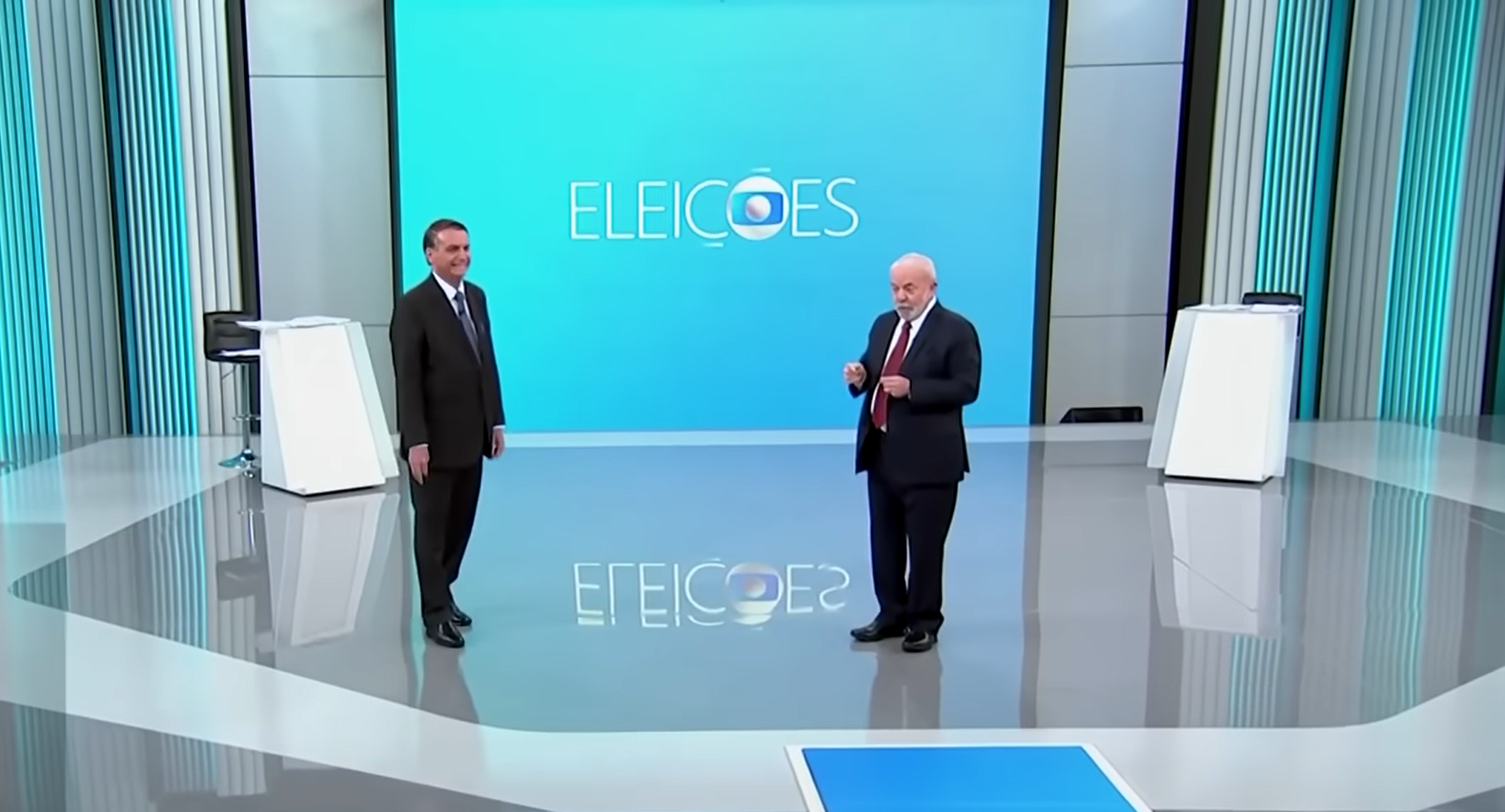
Image: Globo TV
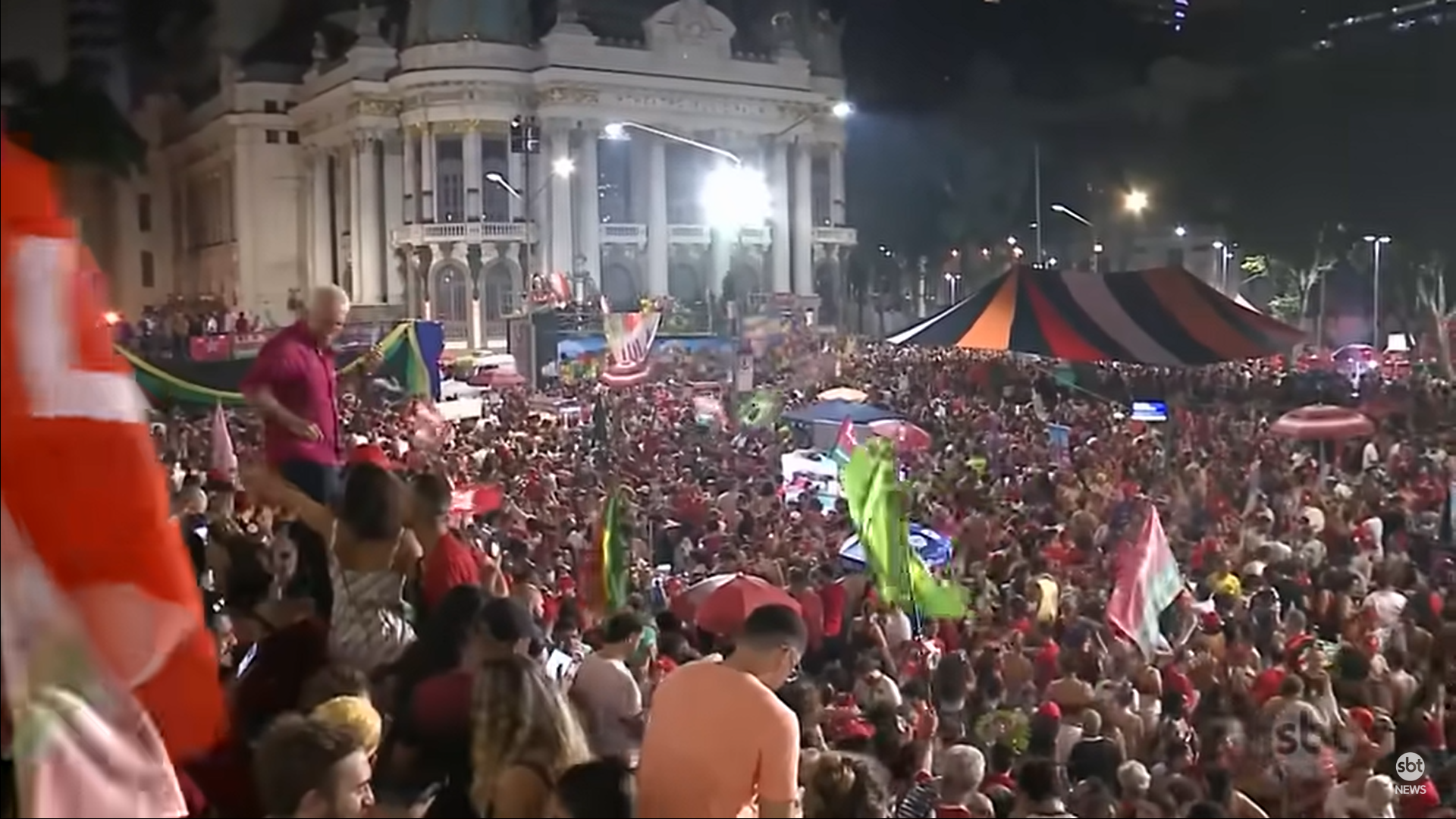
Image: SBT News
September Activity Report
30 September 2022
Global Japan Office Coordinator
Leonardo Brescia de Sousa Henriques
September 7th is an important Brazilian civic date. It celebrates the Declaration of Independence of Brazil from the Portuguese Empire which took place in 1822. This year, the date was more remarkable, since the Bicentennial of the Independence of Brazil was celebrated.
All Brazilian children know the official history that says that Brazil broke its connection with Portugal and consolidated itself as an independent nation when Emperor Pedro I, known as Pedro IV in Portugal, proclaimed the cry “Independence or Death” on the banks of the Ipiranga River, in the current city of São Paulo.
An emblematic artistic representation of this historic event is the 19th century painting Independence or Death by the Brazilian artist Pedro Américo. The painting is considered the most consecrated and widespread representation of the moment of Brazilian independence, having become a reference.
Independence celebrations in Brazil take place mainly in Brazil's large cities and are marked by parades held by the Brazilian Armed Forces. There are parades of the Navy, Army and Air Force, as well as parades of bands and even veterans of the Brazilian Expeditionary Force, who fought in World War II. The Smoke Squadron, an Air Force detachment famous for performing acrobatic exhibitions with airplanes, made exhibitions in the capital, as usual.
In Rio de Janeiro, there was a performance by the free jump team of the Brazilian Air Force's Parachute Infantry Brigade, which performed a demonstration with landing on Copacabana beach, and, in addition to the Army and Air Force parade, there was a Naval parade with the participation of ships from the Brazilian Navy and from friendly countries, departing from the Recreio dos Bandeirantes neighborhood sea towards the Guanabara Bay.
Finally, the Brazilian fleet and artillery stationed at the Copacabana fort executed 21-gun salutes in honor of the Bicentennial of Brazil's Independence.
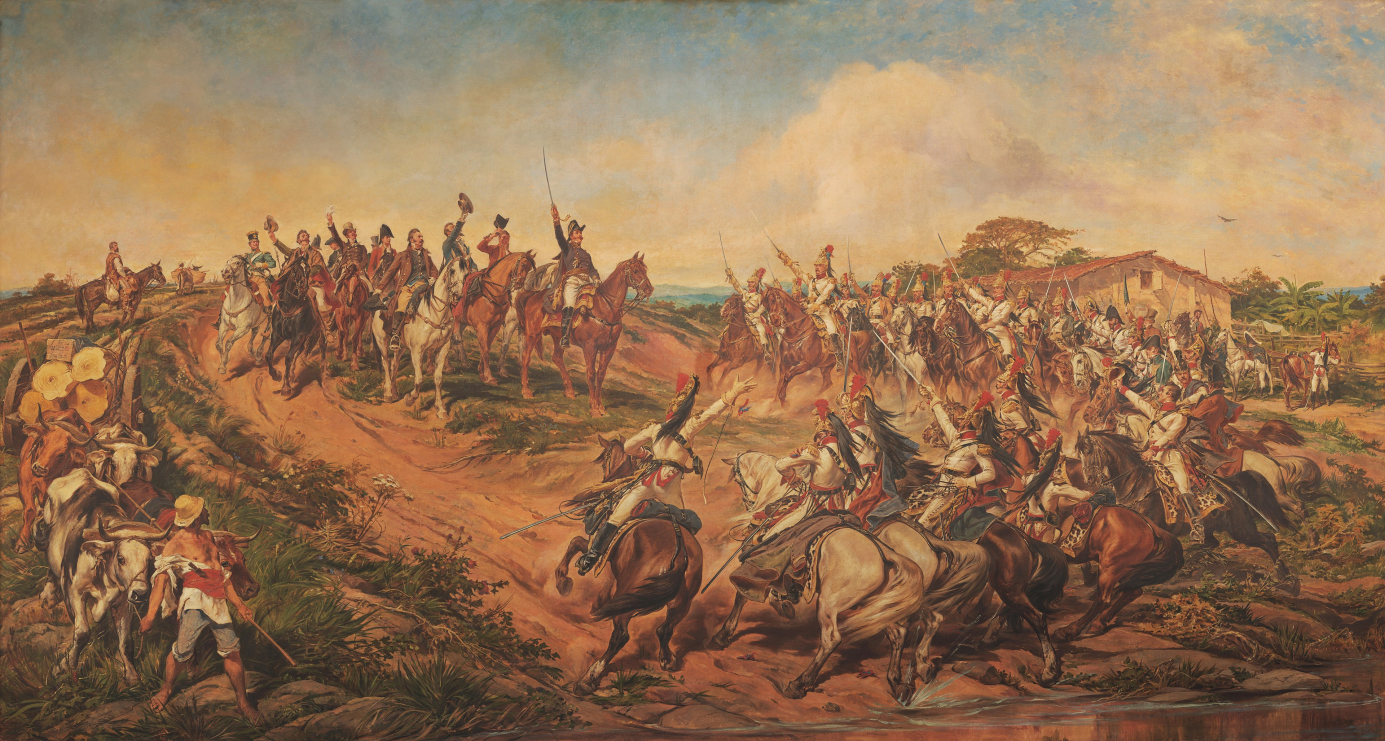
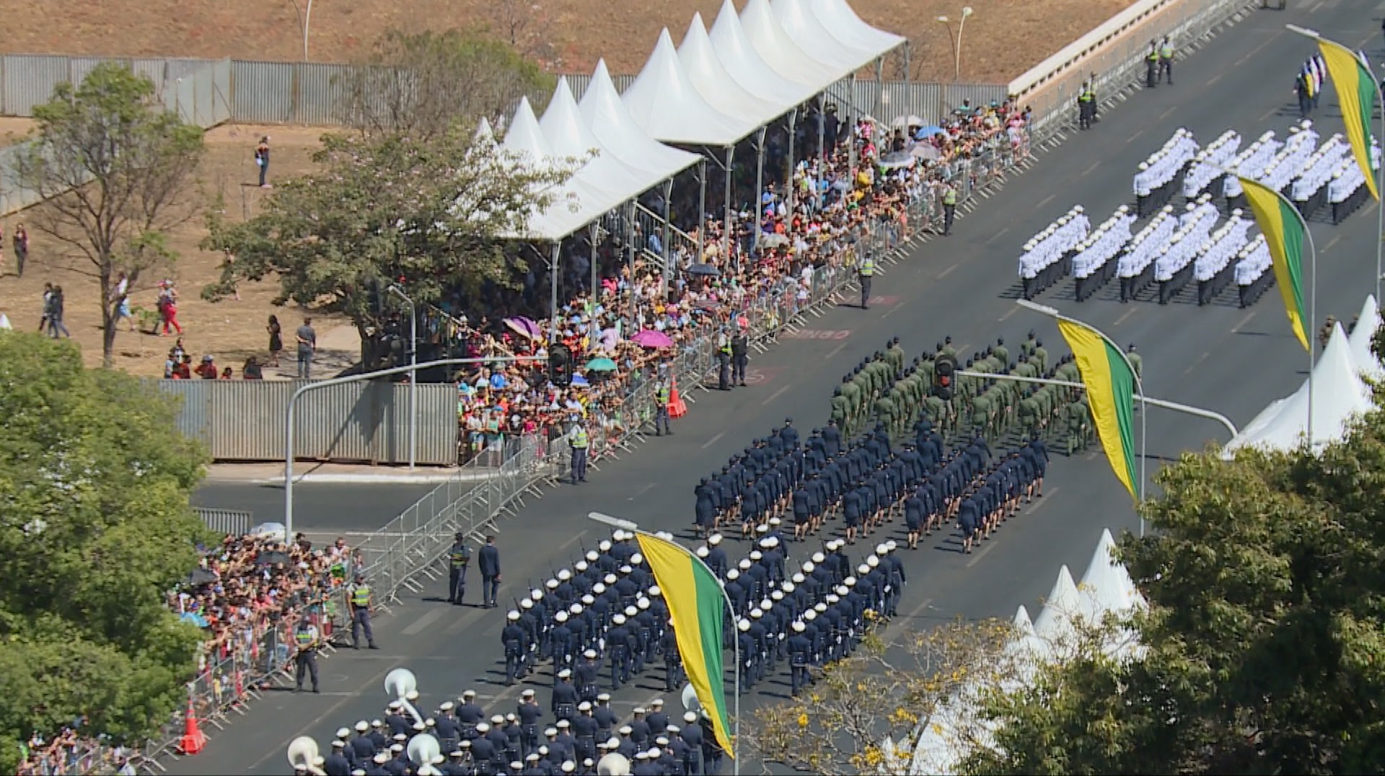
Photo: Brazilian air force (FAB)

Photo: Brazilian air force (FAB)

Photo: Reproduction/Globo TV
August Activity Report
31 August 2022
Global Japan Office Coordinator
Leonardo Brescia de Sousa Henriques
This month, the UERJ International Cooperation Office promoted events with the presence of representatives from Japan.
The first event, held on August 9, was a “welcome meeting” in which the current two TUFS exchange students participated, as well as other foreign students, who were welcomed by the Rector of UERJ, Prof. Mario Sergio Alves Carneiro. In addition to the Rector, other authorities of the Institution were present, such as Professor Luís Antônio Campinho Pereira da Mota, Pro-Rector for Graduate Studies and Research and Professor Catia Antonia da Silva, Pro-Rector for Student Policies and Assistance.
This is a significant event, as this is the first academic semester after the pandemic that UERJ receives students from abroad. The students are from Colombia, Spain, Germany and, of course, Japan, and they are enrolled in subjects of courses such as International Relations, Engineering, Language and Literature, Arts and Social Sciences.
On August 22, the International Cooperation Office held another event in which eight international agencies participated. The objective was to present the University's internationalization programs, including the most recent one, the Virtual Exchange Program (VEP), through which UERJ courses will be offered at foreign universities and vice versa. The meeting, led by Rector Prof. Mario Carneiro and the Director of International Cooperation, Prof. Cristina Russi, was attended by representatives from Japan, Germany, France, Ireland, Switzerland, Canada, USA and Portugal. Japan was represented by the newly arrived Vice Cultural Consul of Japan in Rio de Janeiro, Mr. Usui Takaaki.
Through the VEP, UERJ undergraduate students will be able to live the experience of international exchange for free and without leaving home, since, unfortunately, not all students have the opportunity to participate in face-to-face exchange programs. The Program aims to provide greater communication skills with people from different cultures and to develop transversal skills, which can make a difference in the labor market, in addition to encouraging students to seek master's and doctoral programs abroad.
The advantages of the program also include the increase in international partnerships on the part of UERJ professors, which includes the strengthening of the University's relations with Japanese institutions.
Below are some images of the events promoted by the International Cooperation Office:
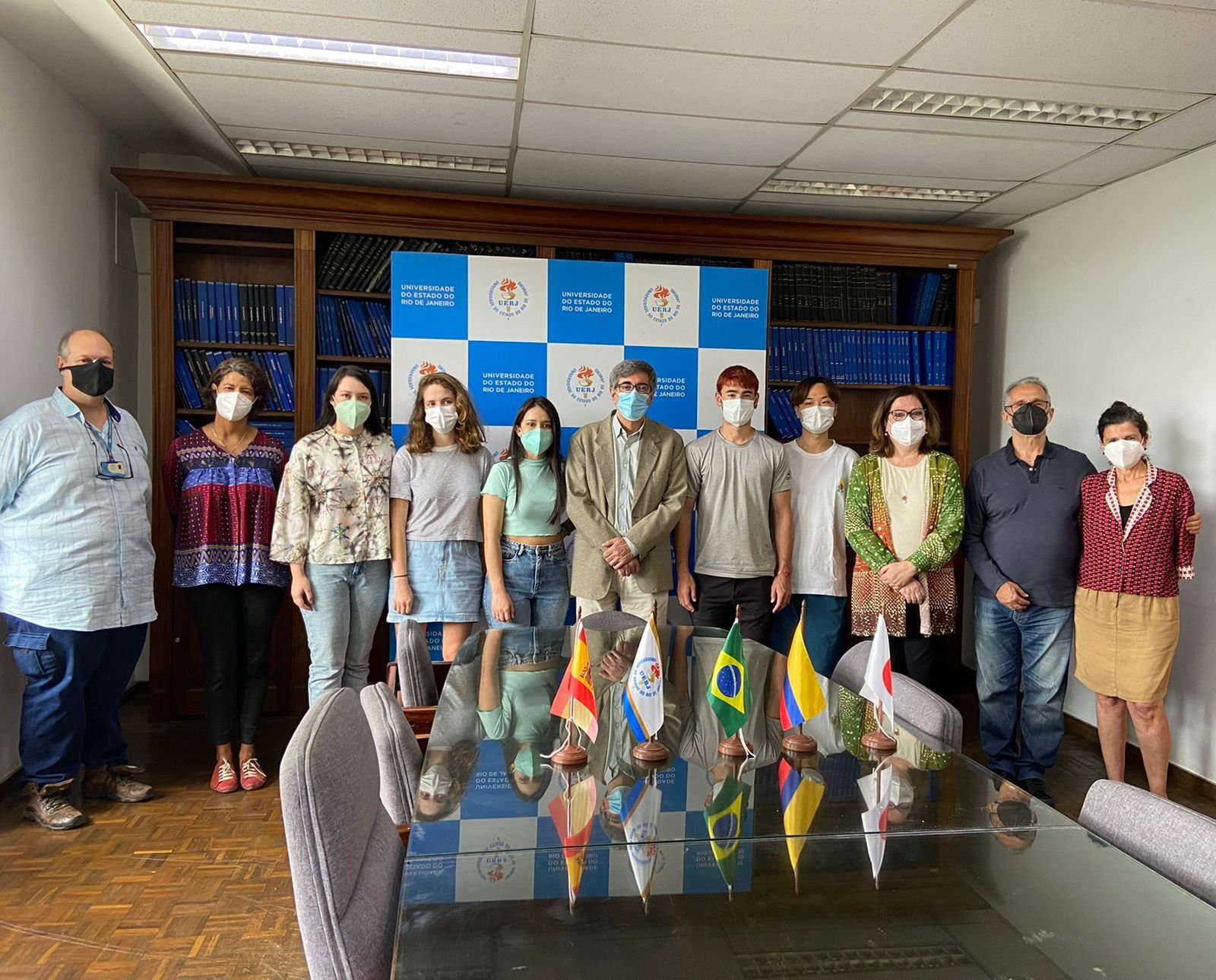
The Rector of UERJ in the center, the exchange students and International Cooperation Office representatives
Photo: UERJ Int’l Cooperation Office
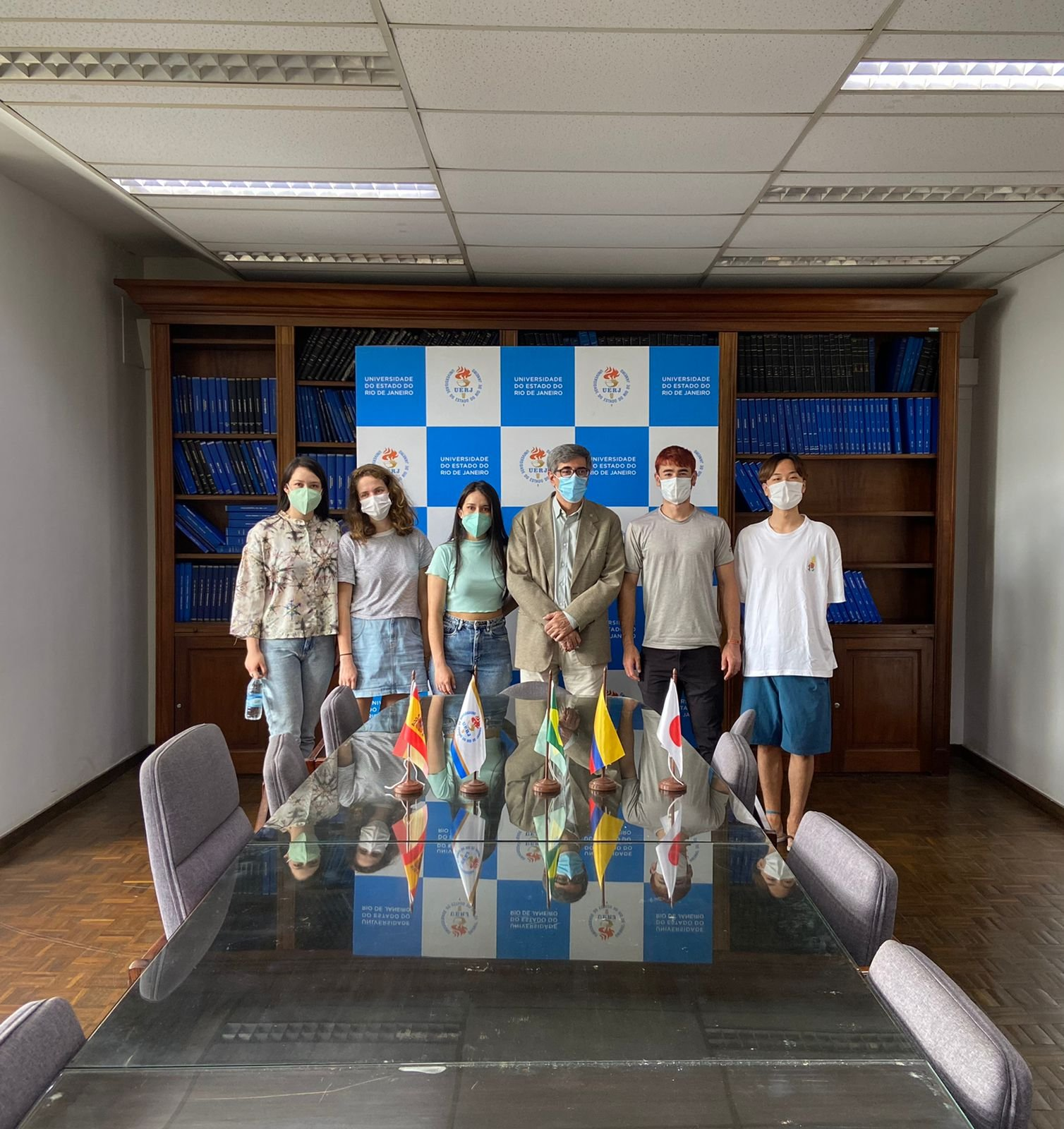
The Rector, Prof. Mario Carneiro, with the exchange students
Photo: UERJ Int’l Cooperation Office
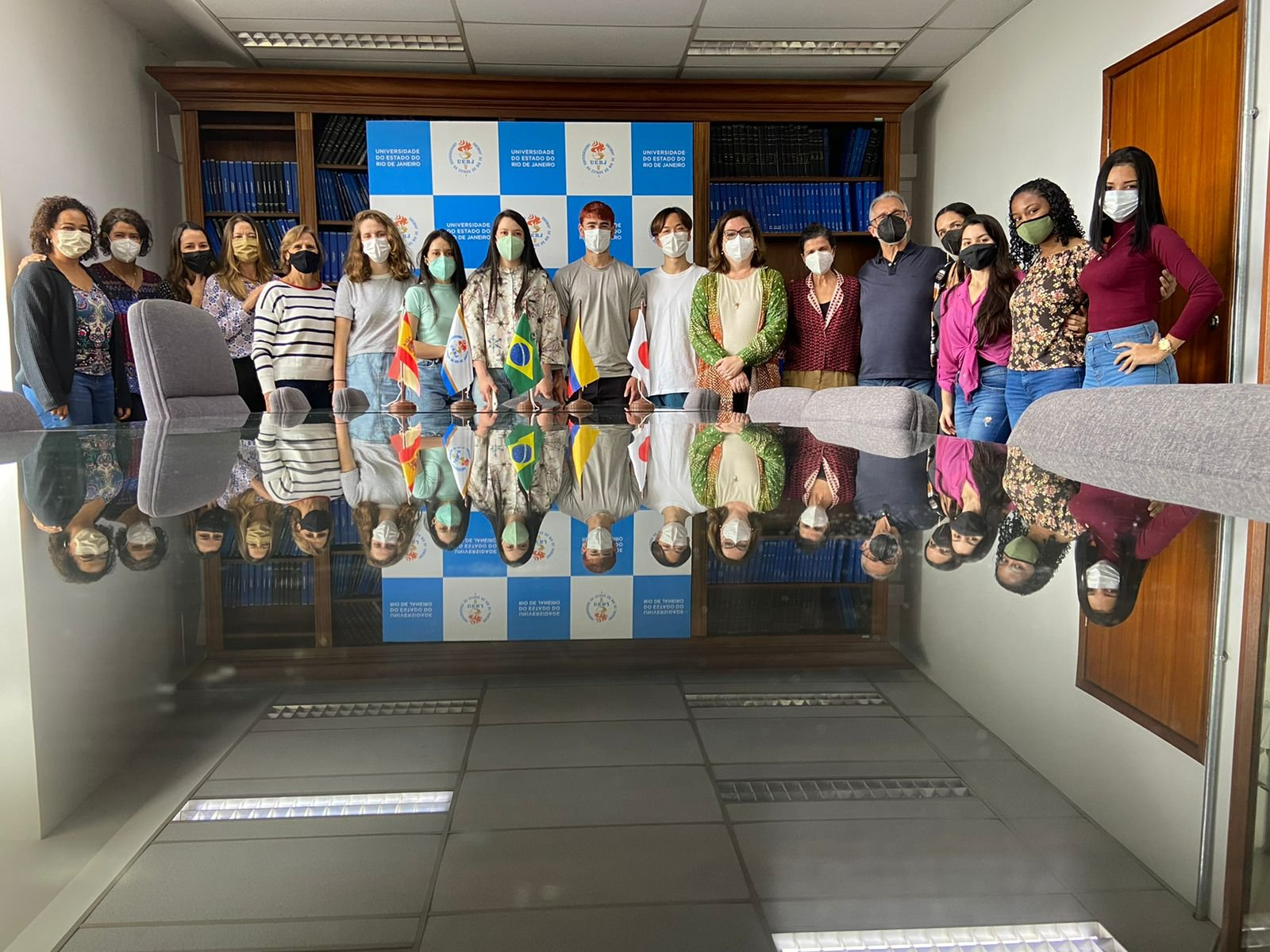
The five exchange students in the center along with the International Cooperation Office representatives
Photo: UERJ Int’l Cooperation Office
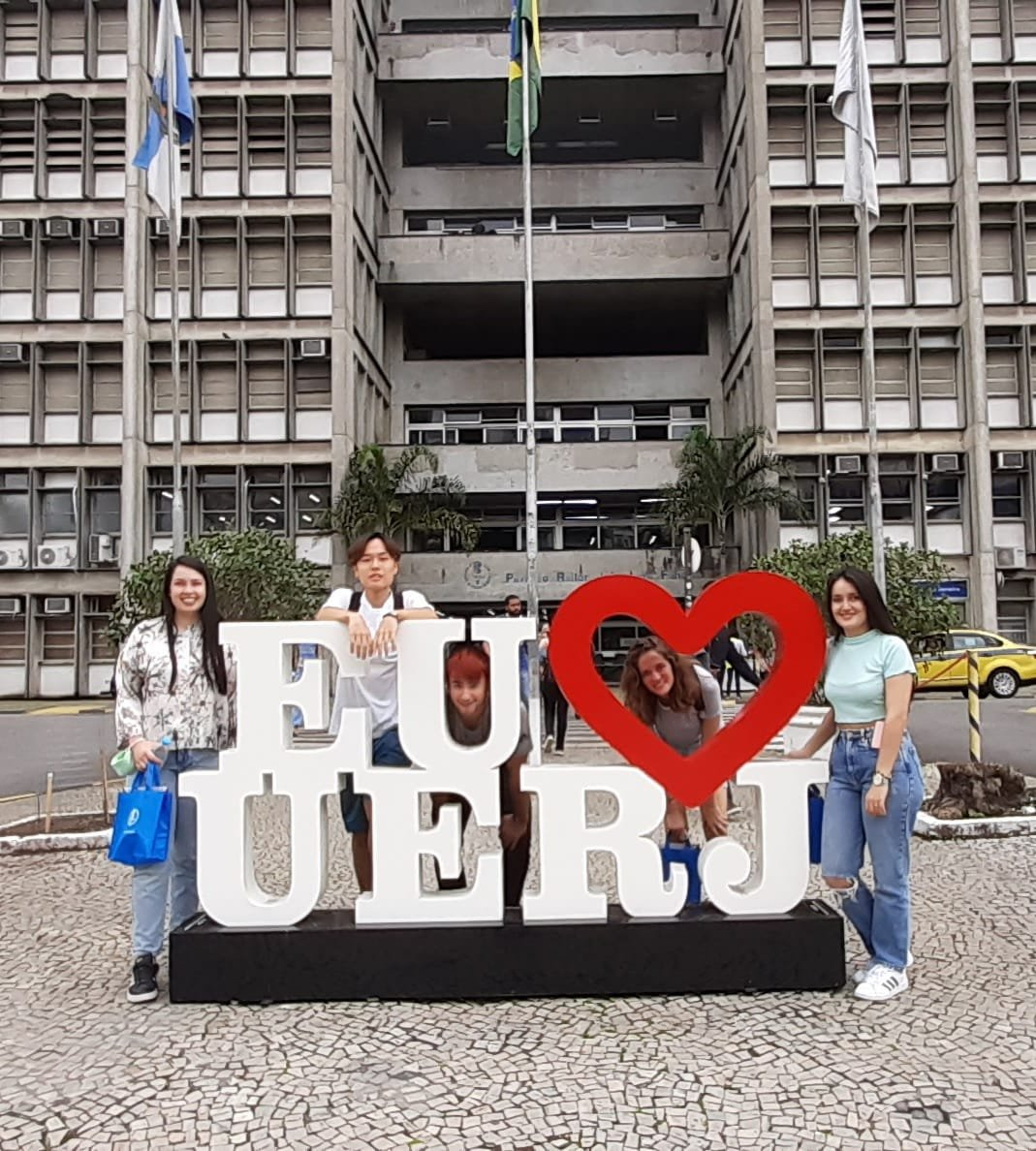
The exchange students in front of the UERJ main building, at the sculpture that reads "I ♥ UERJ"
Photo: UERJ Int’l Cooperation Office
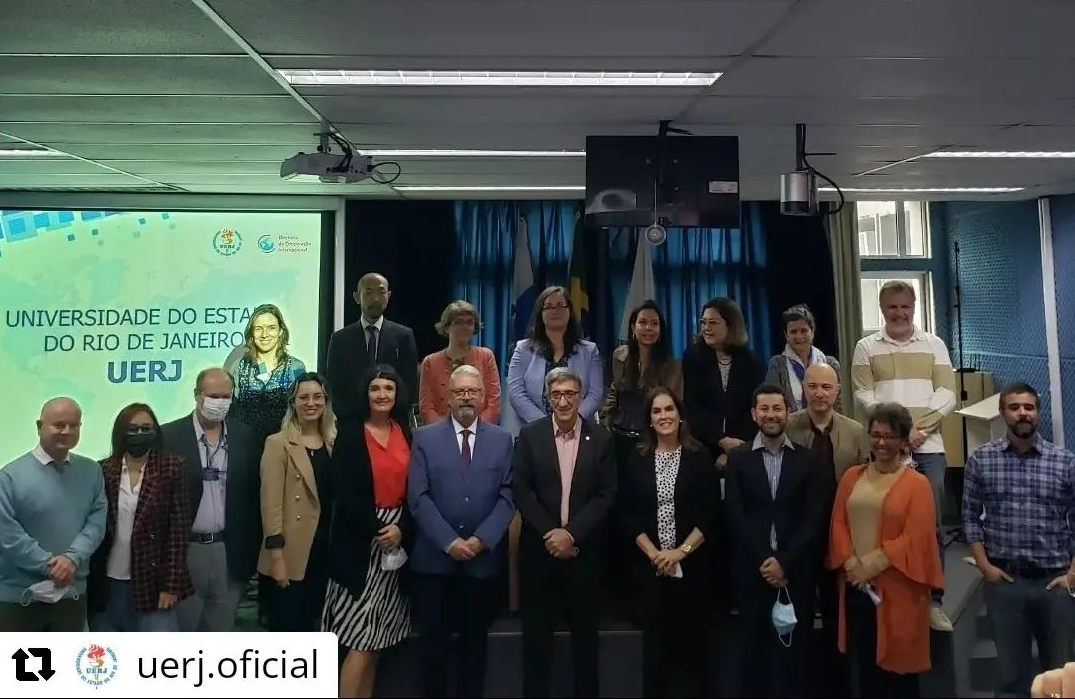
UERJ authorities with representatives of eight international agencies at the event on the 22nd
Photo: UERJ Int’l Cooperation Office
July Activity Report
31 July 2022
Global Japan Office Coordinator
Leonardo Brescia de Sousa Henriques
This month, UERJ received distinguished visitors, on the 5th, in a ceremony to celebrate the donation of books offered by the Nippon Foundation through the Read Japan Project, whose mission is to promote the understanding of Japan around the world through books.
UERJ received more than two hundred books in English in the area of Japanese Studies, of which one hundred were sent to the library of the Law School and the others to the Institute of Letters of the University.
It is worth remembering that recently UERJ and JICA established a cooperation agreement creating the JICA Chair at the Law School, where Brazil-Japan bilateral studies in the legal area have been gaining importance.
The ceremony was attended by the Hon. Consul General of Japan in Rio de Janeiro Mr. Ken Hashiba; Representatives of the Consulate; the Rector of UERJ, Prof. Mario Sergio A. Carneiro; Pro-Rectors; the Director for International Cooperation, Prof Cristina Russi; the Director of the Institute of Letters, Prof Janaína da Silva Cardoso; Representatives of the Law School; the Professors of the Japanese Department; the Visiting Professor Mari Fujiwara; the TUFS Global Japan Office Coordinator, among others.
After the ceremony, which took place in the auditorium of the Rectory, the Consul General and the Consulate Representatives visited the Graduate Program of the Law School, the library, the Minato Laboratory of the Institute of Letters, among others.
Here are some pictures of the ceremony and visit:
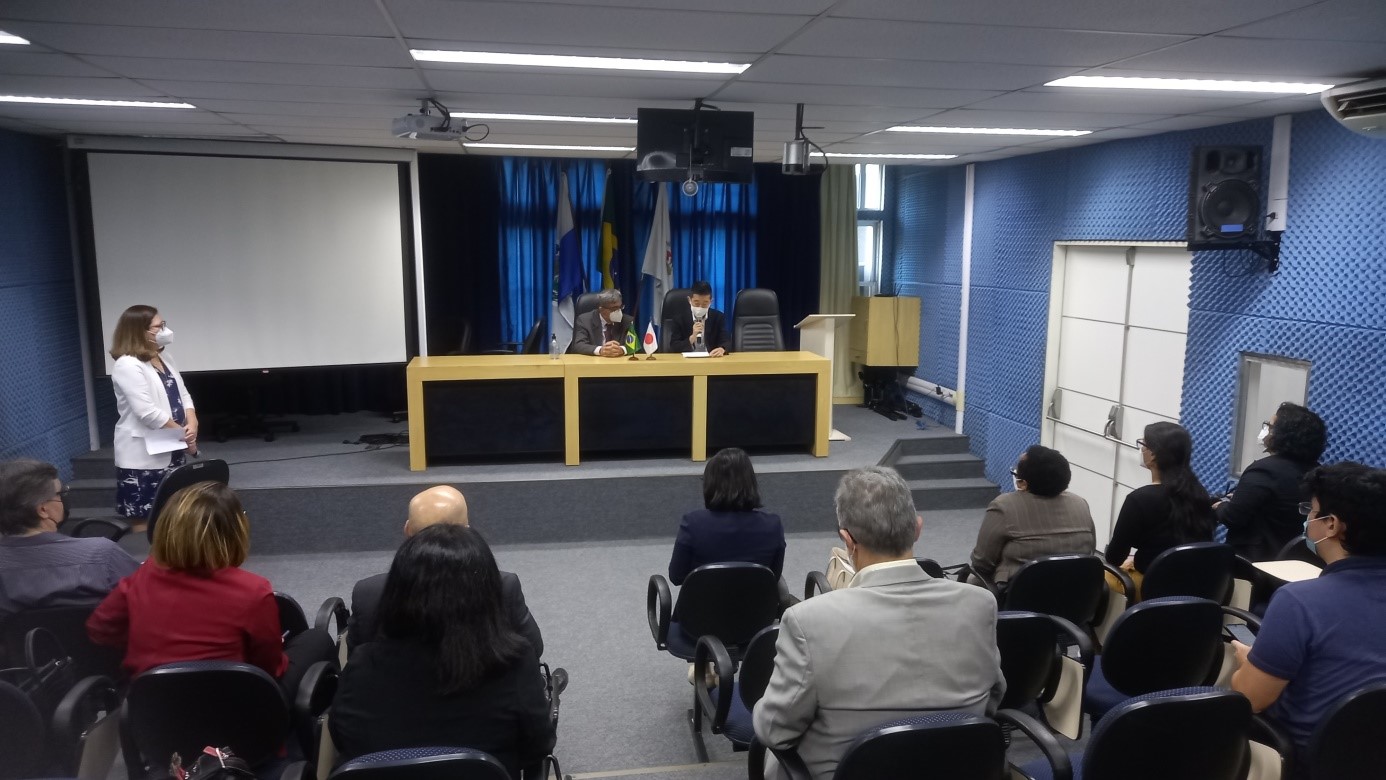
The Rector of UERJ and the Consul General of Japan in the background / Prof. Cristina Russi standing on the left
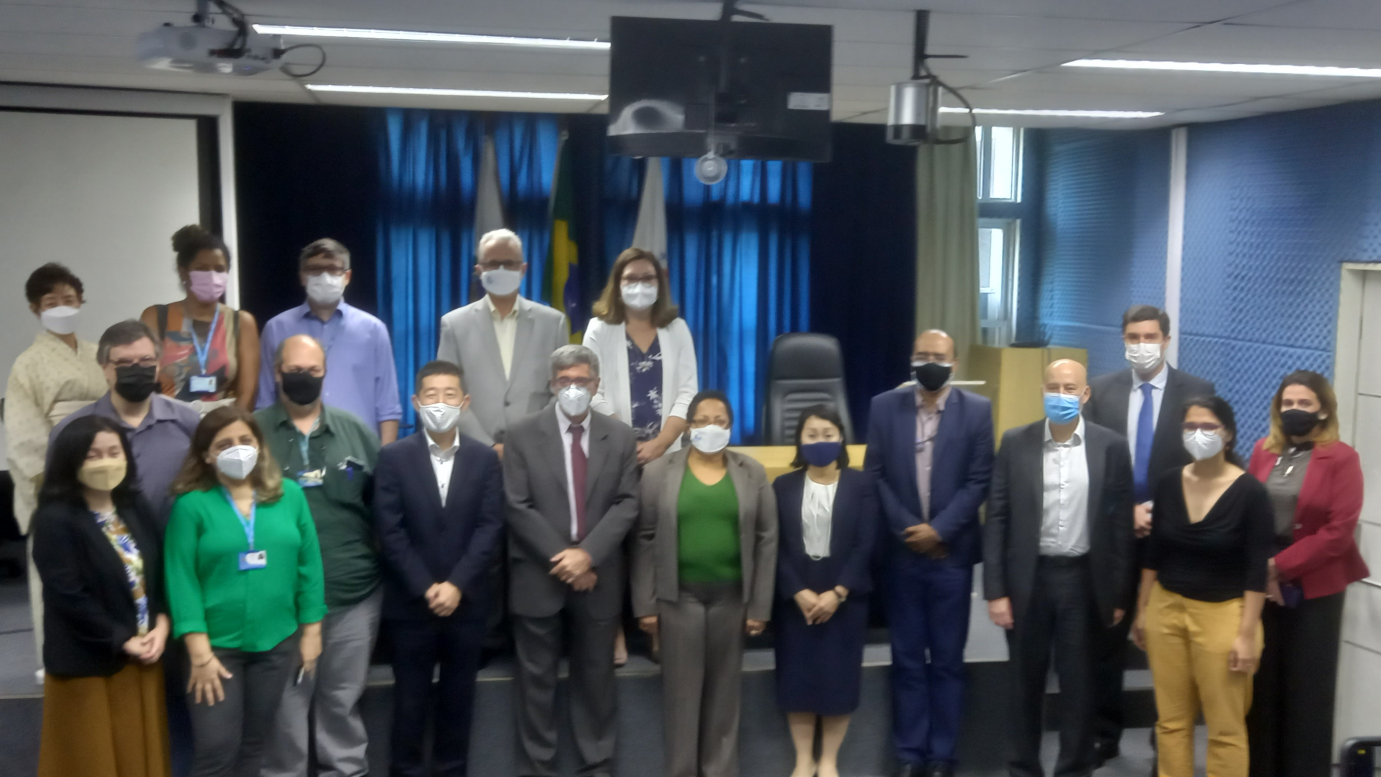
Some of the participants of the event in the auditorium of the Rectory
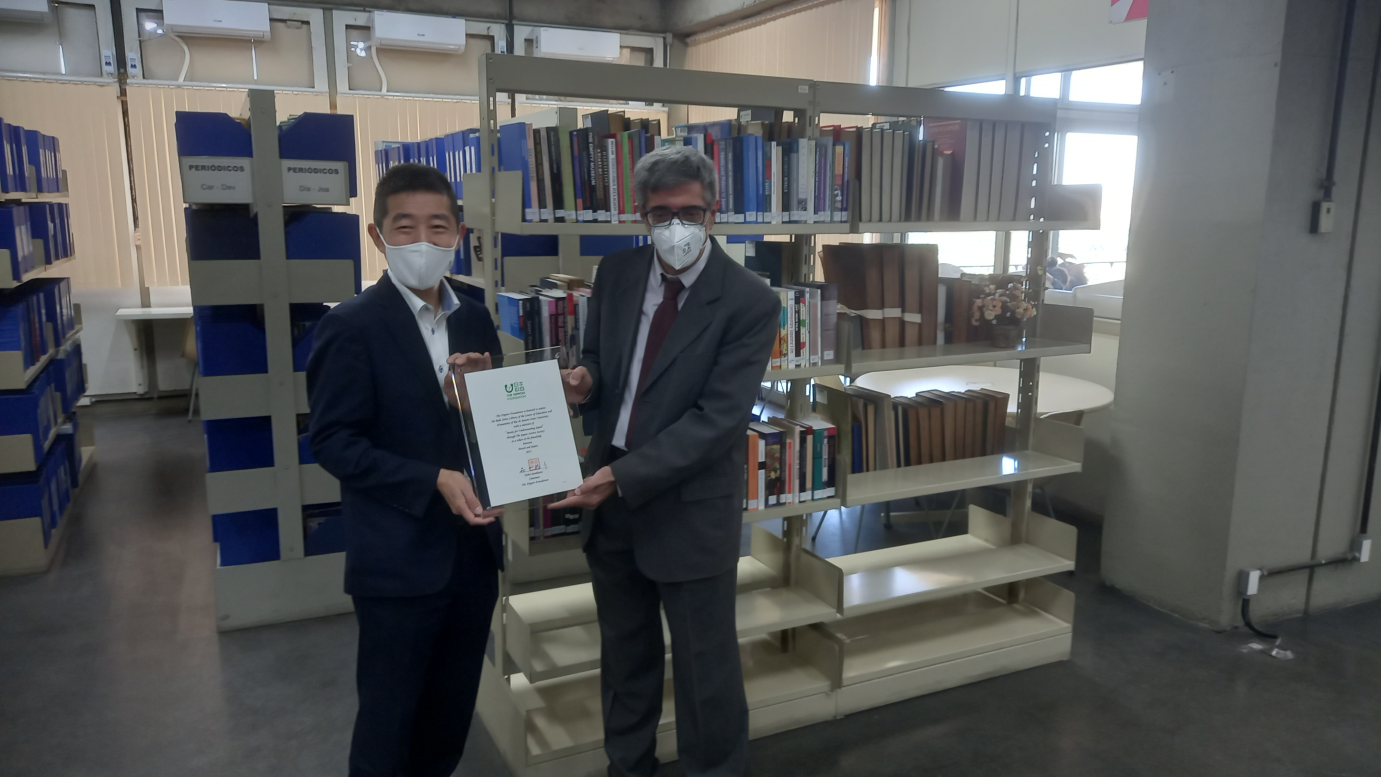
The Consul General of Japan and the Rector of UERJ with the book donation term at the library
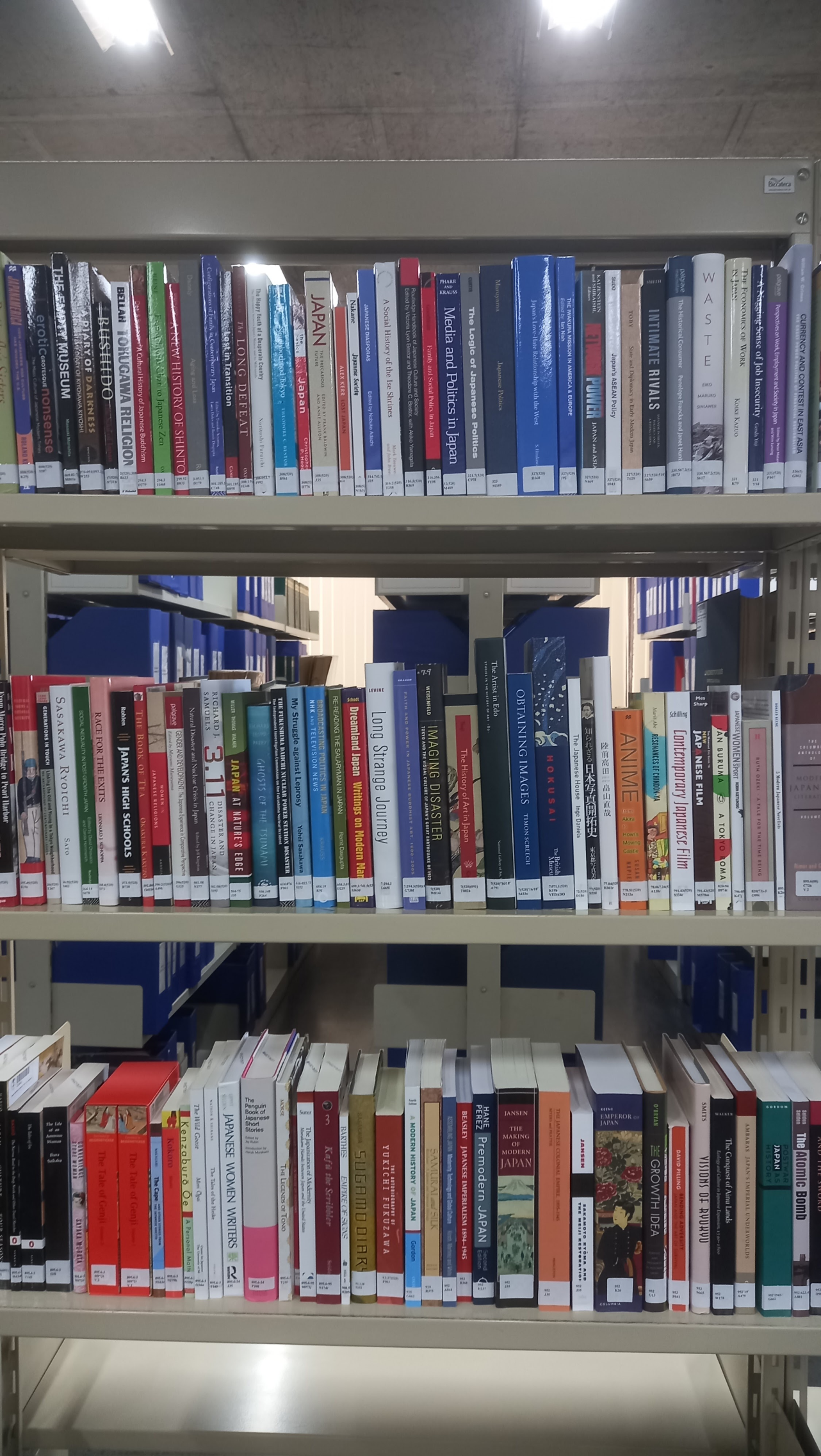
Some of the donated books
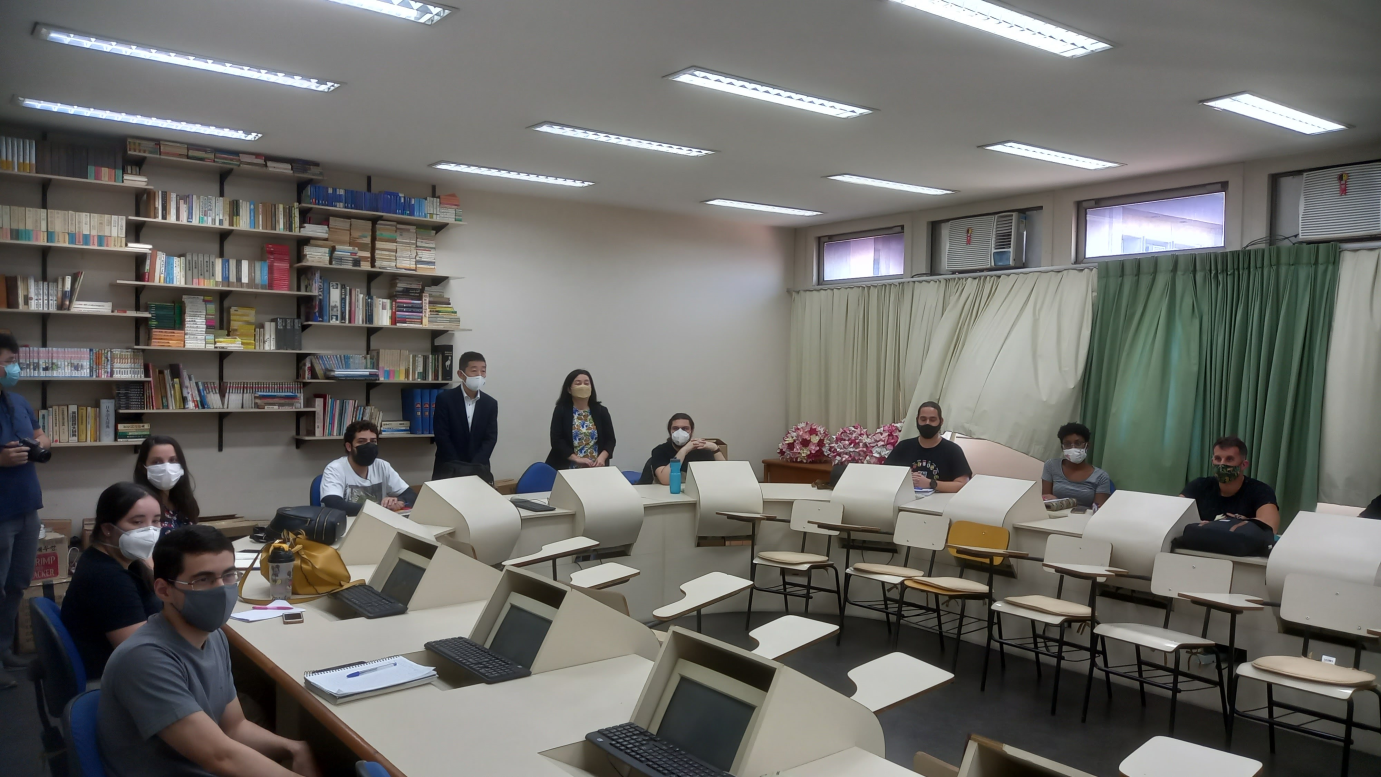
Visit of the Consul General to the Minato Laboratory
June Activity Report
30 June 2022
Global Japan Office Coordinator
Leonardo Brescia de Sousa Henriques
In the month of June, in Brazil, a popular event called Festas Juninas (June Festivals) is celebrated. It is a traditional festivity common in all regions of the country, especially in the northeast. It was brought to Brazil under the influence of the Portuguese in the 16th century.
The Festival was originally pagan, but it was incorporated into the festive calendar of Catholicism so that typical elements of pagan celebrations received new meaning. The Christianization of the Festival is directly related to the establishment of commemorations of important figures of Catholicism, among which Santo Antônio (Saint Anthony), honored on June 13th; São João (Saint John), honored on 24th and São Pedro (Saint Peter), honored on 29th.
The Festival has peculiarities such as the folk dance called quadrilha (square dance), in which couples, dressed in rustic attire (men wear jeans, checkered shirts and straw hats, and women wear colorfully patched dresses or full skirts), perform a choreographed dance to the sound of typical music played with instruments such as accordion, viola and percussion ones.
The typical food is, for the most part, goodies made from corn, coconut, peanuts, whether sweet or savory, such as hominy, couscous, paçoca (peanut candy), curau corn, pé-de-moleque (peanut brittle), pamonha, popcorn, sweet corn cake, corn on the cob, candy apple, among others. In the southeast, where Rio de Janeiro is located, it is also common to serve a drink called quentão, made with cachaça, ginger, cloves and cinnamon.
At the Festival, there are also games with gifts, such as easy fishing, ring toss, big mouth toss, greasy pole, bingo, among others. The decoration is composed of flags cut in different colors and in a specific format, hanging on wires, interspersed with accordion paper lanterns and balloons, as well as a bonfire.
The bonfire is very important with regard to the characterization of the party. It helps to warm up the party-goers, as the June Festivals usually take place in the colder months in the southern hemisphere.
The June Festivals are part of the calendar of the city of Rio de Janeiro and are the second largest popular festival after Carnival. They occur not only in June, but in July and eventually even in August. At UERJ, there are some Festas Juninas annually. This year, there were two in June, on the 15th and 23rd, and others are scheduled for July.
Below are some pictures related to the June Festivals:

Photo: PIXNIO

Photo: PIXNIO
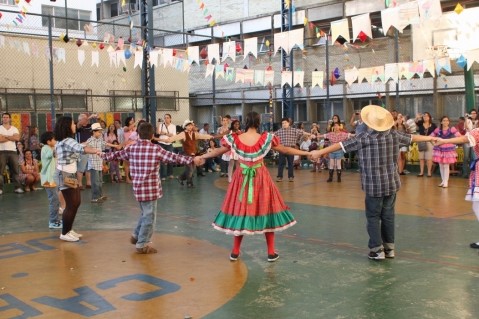
Photo: CAp-UERJ
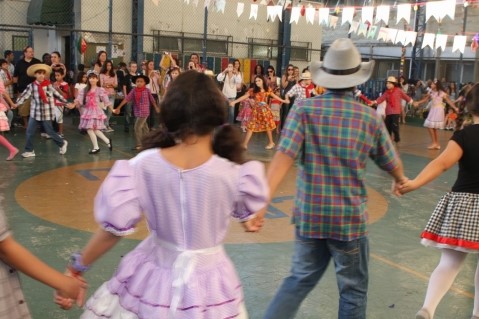
Photo: CAp-UERJ
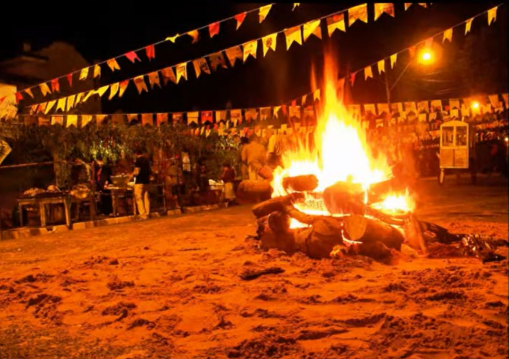
Photo: CAp-UERJ(footage)
May Activity Report
31 May 2022
Global Japan Office Coordinator
Leonardo Brescia de Sousa Henriques
As the COVID-19 pandemic subsides, face-to-face activities are gradually being carried out at the University. Thanks to this, a series of shows began to be held at the UERJ’s theater, officially called “Teatro Odylo Costa, filho”, or, as it is popularly known “Teatrão da UERJ” (UERJ big Theater).
Teatro Odylo Costa, filho was created during the management of Rector Caio Tácito, through a resolution in 1979. However, the completion of works and the official opening of the theater took place only on July 28, 1997, under the administration of Rector Antonio Celso Alves Pereira.
The theater, which has a capacity of 1,106 spectators, has an architectural design by Luiz Paulo Conde, architect and former mayor of the Rio de Janeiro city, and Flávio Marinho Rego. It is a room with privileged acoustics and a stage with excellent dimensions, with perfect visibility from anywhere in the audience, in addition to presenting many other technical qualities that make it one of the best scenic rooms in Rio de Janeiro.
Indeed, this theater is known for having the second largest stage in Rio de Janeiro, being surpassed only by the stage of the Municipal Theater of Rio de Janeiro.
Among the activities that have been publicized since April, there is the screening of documentaries and films followed by debates, such as the film Marighella by Wagner Moura; the presentation of a theatrical play based on the work “A Nova Califórnia” by the famous Brazilian writer Lima Barreto; musical performances and open rehearsals by the Altivoz and Unati choirs, both from UERJ.
Many of the attractions are free or have popular prices. It is a good option for leisure, cultural contact and learning for students in general, including exchange students who come to study at UERJ.
The UERJ Japanese Department has already promoted events at this theater, such as the Waseda Glee Club Choir performance on September 23, 2008; the event “O Japão na UERJ” (Japan at UERJ) on November 27, 2018; a cooking event called “Washoku” and the Ondekoza troupe performance respectively on July 24 and 25, 2018. Hopefully, in the near future, new events will be held in this magnificent theater to present Japanese culture to the Rio de Janeiro audience.
Below are some photos of the theater and events held by the Japanese Department in the Teatro Odylo Costa, filho:
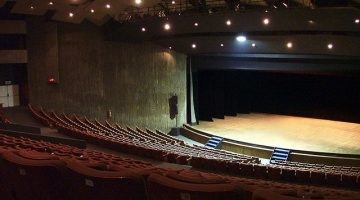
Photo: UERJ
Panoramic view of the Theater audience and stage
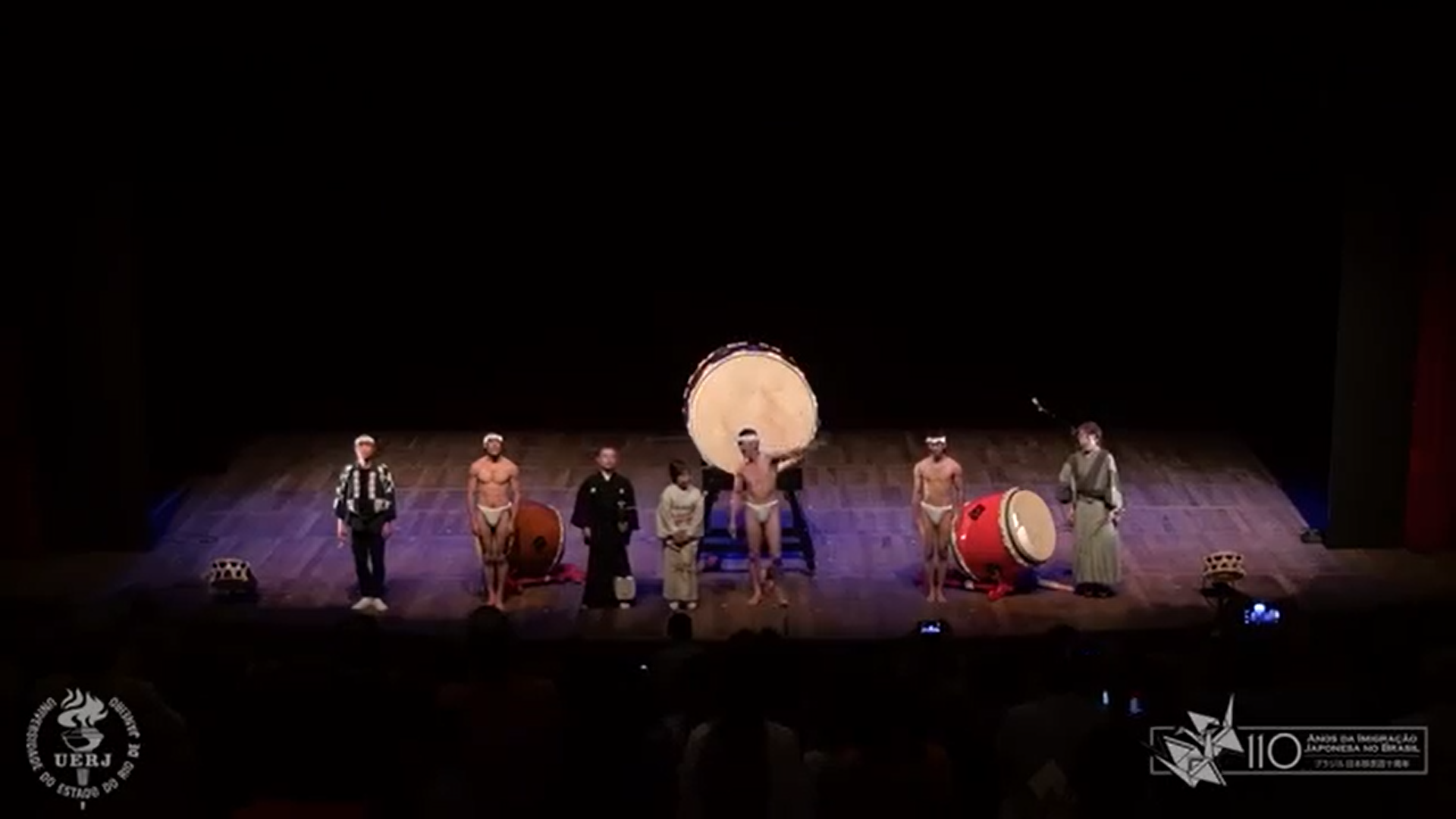
The Japanese troupe Ondekoza on stage, on July 25, 2018
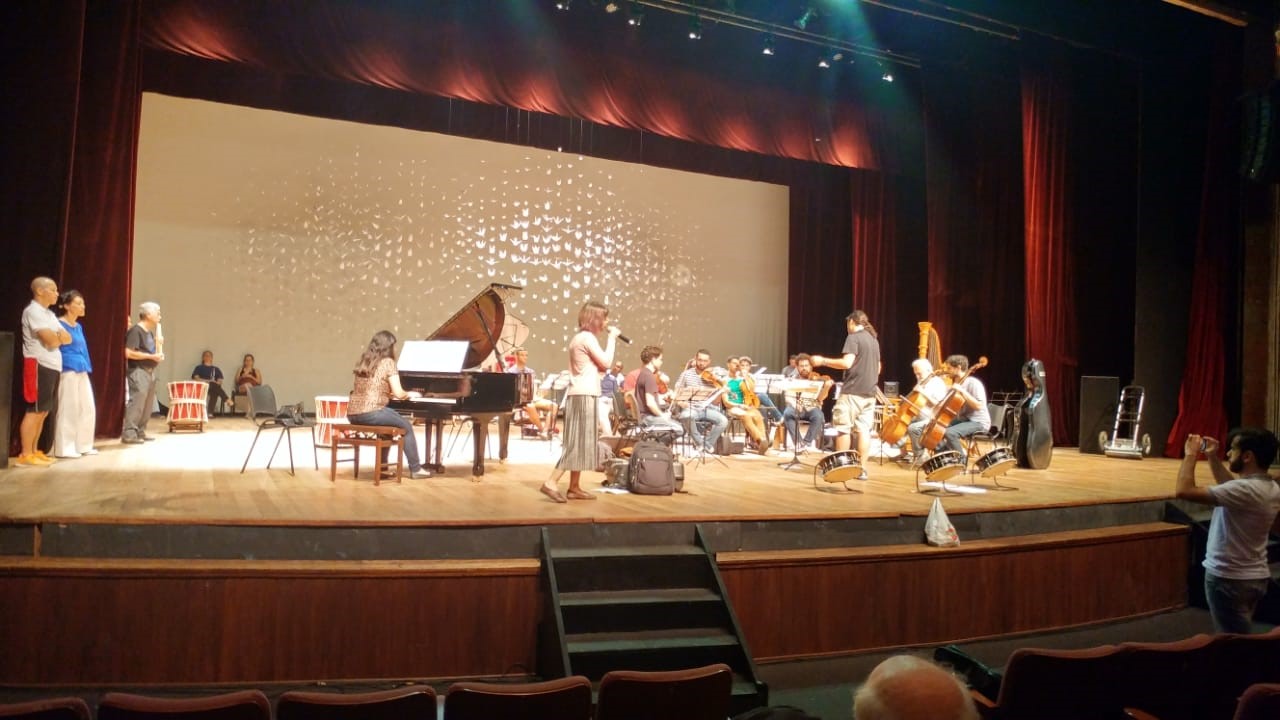
Rehearsal for a musical performance held at the event Japan at UERJ in 2018
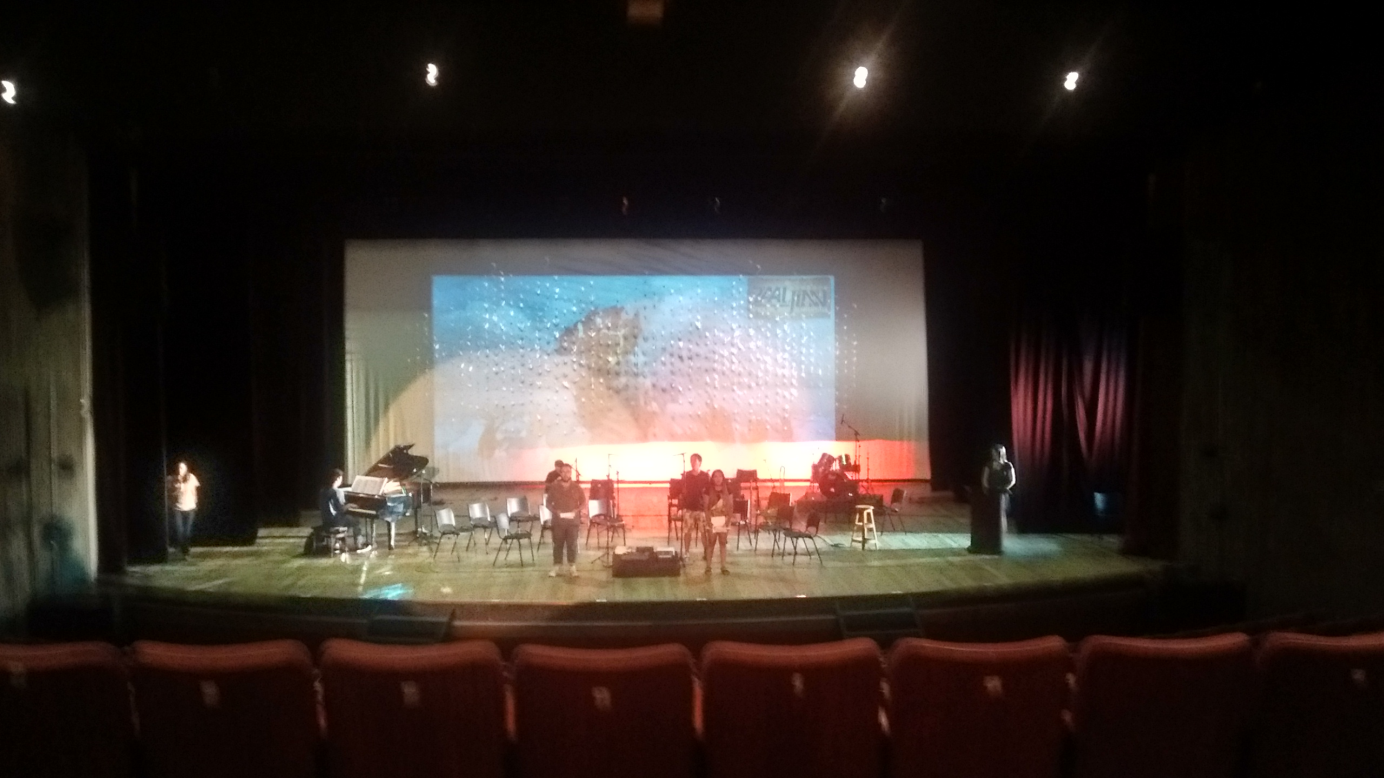
Rehearsal for the event Japan at UERJ in 2018
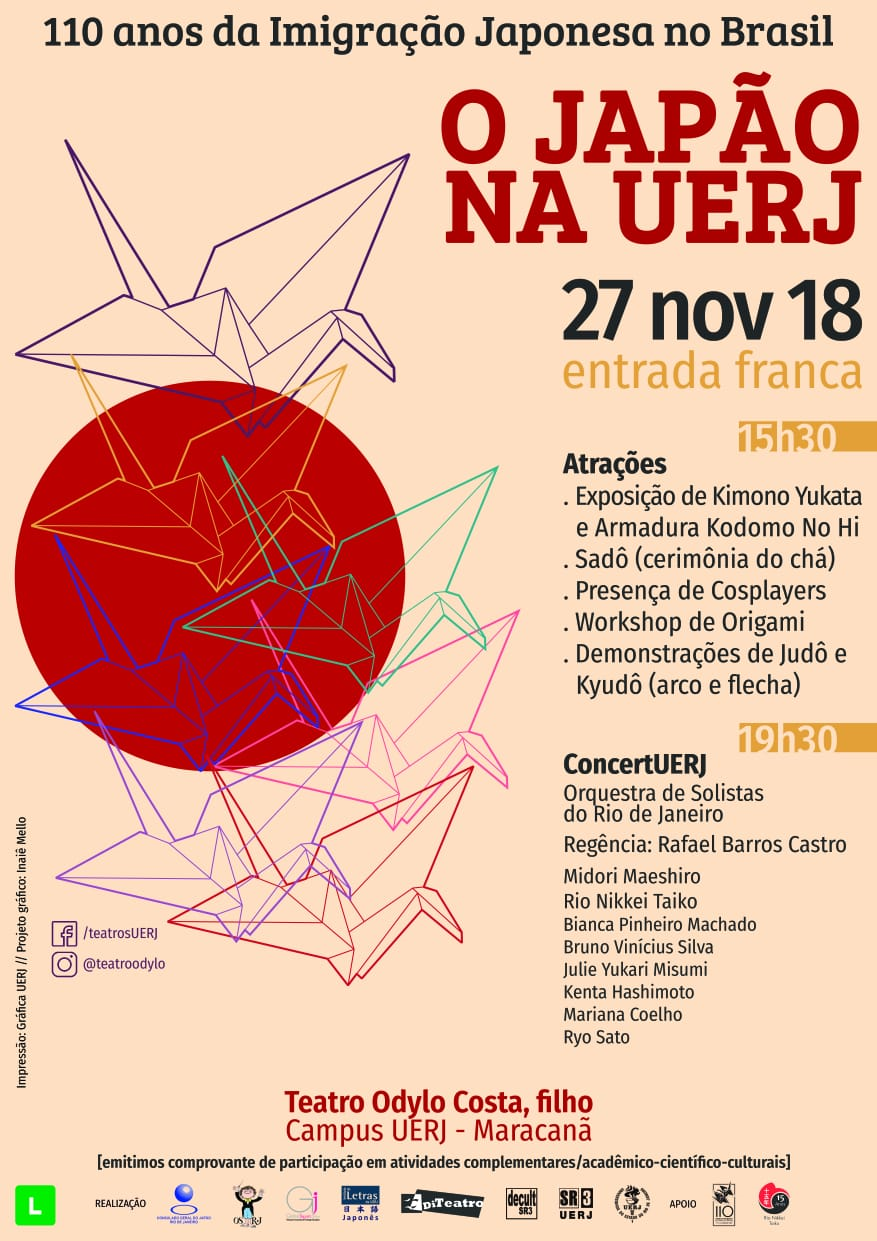
Poster of the event Japan at UERJ in 2018
April Activity Report
30 April 2022
Global Japan Office Coordinator
Leonardo Brescia de Sousa Henriques
Carnival, as everyone knows, is an important popular festival in the Brazilian calendar.
This year, for the first time, Brazil had an out-of-season carnival. The festivities took place in April, with much cooler weather, unlike the usual high temperatures of summer. Carnival 2022 was supposed to take place in early March, but it was postponed due to the pandemic.
Although street blocks were still banned because of Covid-19, the famous samba schools’ parade in Rio de Janeiro and other cities took place, with the mandatory vaccination of revelers and audience, as a rule. It was a slightly different party than usual, but with the usual joy.
As expected, carnival, a celebration that acquired personality as a cultural characteristic of the Brazilian people, is also studied by the academy.
At UERJ, Professor Ricardo Leitão, from the Institute of Letters, coordinates the Project “Acervo Universitário do Samba” (University Collection of Samba). It is an academic initiative in defense of Brazilian culture and samba. It aims to document the greatest personalities in the world of samba, telling the history of carnival for future generations, through photos, books, documentaries, CDs and DVDs, as well as honoring samba schools of Rio de Janeiro and artists who helped build the popular memory of samba.
One of the products of the project is the launch of a series of DVD-books/CD-books that is in its fifth volume and that will be expanded over the years, always presenting and disseminating themes that rescue the popular and musical memory of the universe of samba in Rio de Janeiro.
Below are the social networks links of the “University Collection of Samba” project, where further information on the theme can be found, as well as illustrative images of the parade in Rio de Janeiro and the project.
On Instagram: https://www.instagram.com/acervodosambauerj/
On Facebook: https://www.facebook.com/profile.php?id=100041851130123

Photo: LIESA (publicity)
Samba schools’ parade in Rio de Janeiro
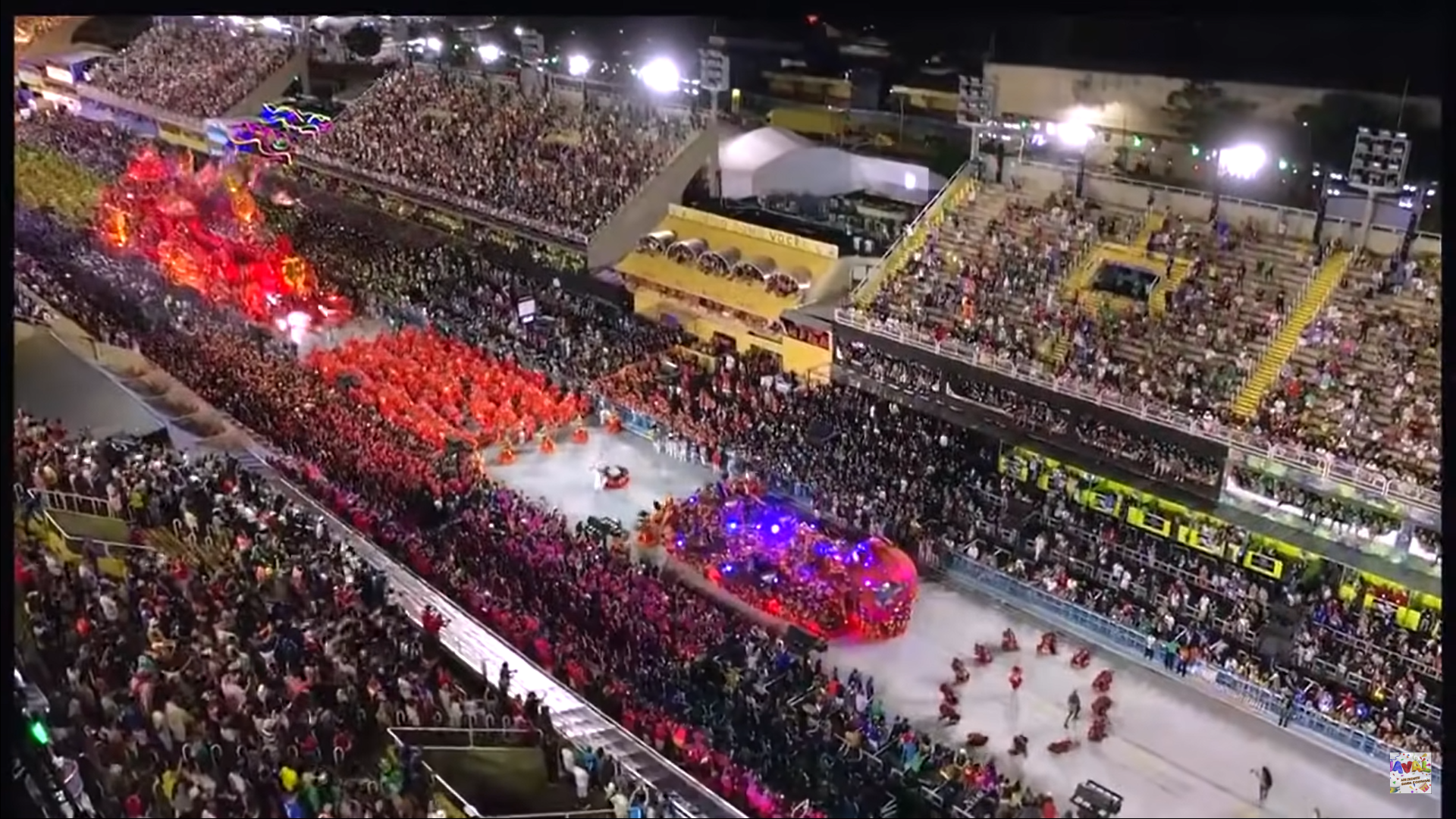
Samba schools’ parade in Rio de Janeiro 2022
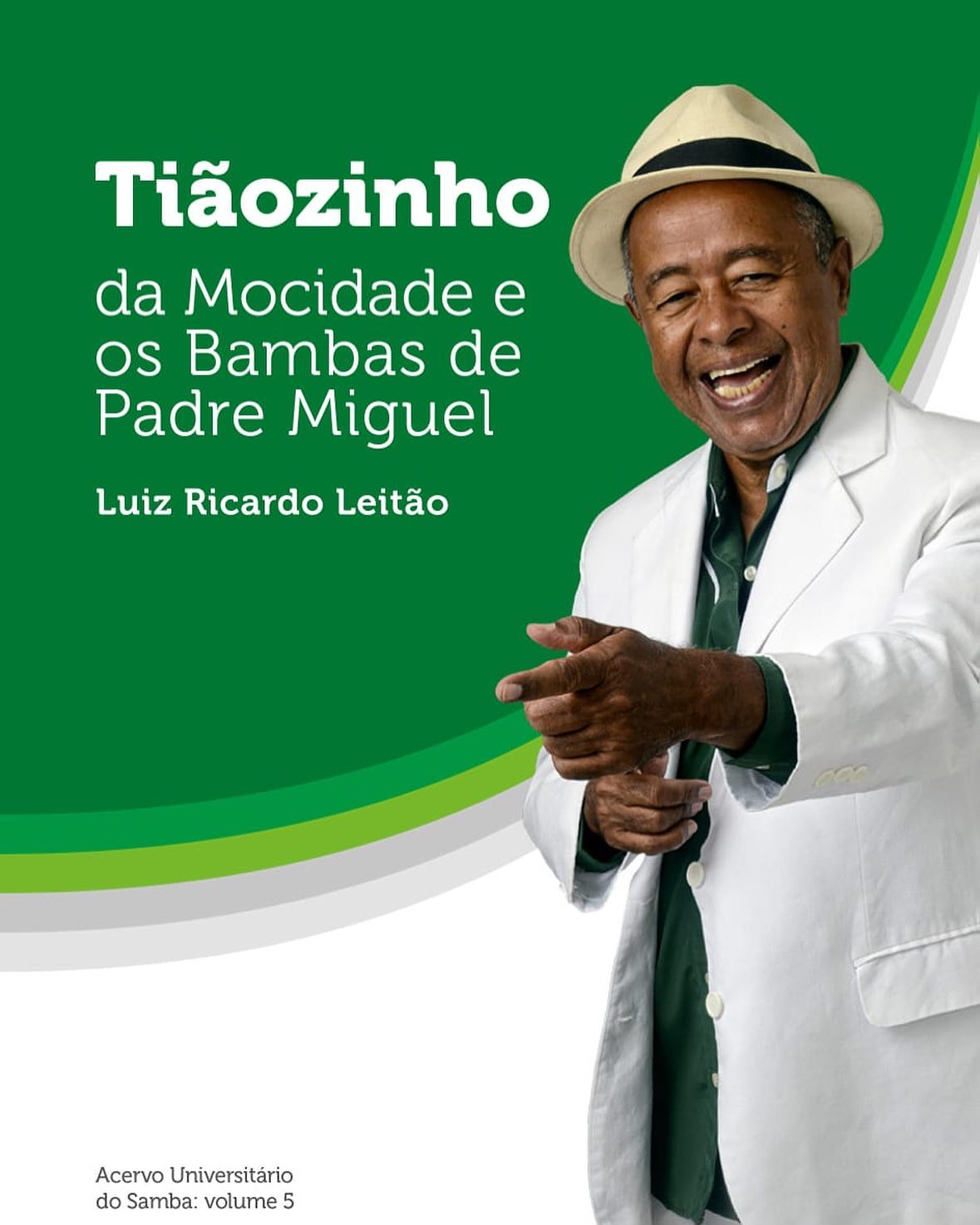
Image: CD-book cover (art by Alexandre Machado)
Cover of the 5th volume of the “University Collection of Samba” book series
